#wheres the examination of the characters in differing situations?
Explore tagged Tumblr posts
Text
Thank you! Thank you for bringing up a really interesting point and idea, and thank you for reading my reblog and giving it both thought and a respectful reply. This is literally all I was trying to get at.
Re: bravery - I agree, it's a spectrum, though I have a different perspective on what that looks like. I don't think there's a need to qualify bravery as good or bad, better or worse, as OP did. Like you said, different situations and factors matter. But I disagree that raising a child is merely hard and therefore doesn't require bravery, and instead think that it requires a different kind of bravery than, say, what Harry or Snape faced. The stakes are lower when it comes to being in immediate danger or the number of people an individual's actions will affect, but there's also a long-term commitment that requires a lot of emotional and physical work and dedication and compensating for an irreplaceable loss (and we see that both Harry and Neville, despite their wildly different support systems and degree of love given as children, both bear the scars of growing up without their parents).
To draw a parallel, I have chronic illness, and people sometimes say "oh you're so brave, going through all that" and I think, "no I'm not, it's just hard." A friend of mine has a similar illness. When they contracted the condition that caused it, they knew what they were facing - a long, hard road full of pain, anxiety, and difficulty. But they didn't cry or fall apart, they faced it with grace and, frankly, bravery. I don't know if I see that in myself, but I know that this is hard, and they knew exactly what they had no choice but to go through, and still faced it. They were facing difficulty, but not imminent danger, but nevertheless I can't imagine describing their attitude without the word "brave." Similarly, choosing to raise a child alone isn't just hard, it requires the kind of bravery that knowingly walking into long-term hardship with your head held high requires. I think the second we choose to focus on qualifying bravery instead of examining it in its own context, we diminish that which falls on the lower end of the spectrum, and do so needlessly. Again, I think it's possible to appreciate one thing without diminishing another. Regulus was brave in a way Snape or Harry never had to be, because their situations were different; was the outcome more or less helpful or impactful? Are we looking at it through the lens of lives saved or which character had to push through more personal fear or who suffered more or less and what do we mean by suffering ie. physical or emotional or are we looking at it from the perspective of who was alone and who had support or who had more or less to lose or... etc. That's how I see the spectrum, but not as one where it's possible to assign more or less objective value to someone's bravery, because there are inevitably multiple subjective angles to view it from.
Re: relativism - I wasn't clear with my meaning, and that's on me. When I said "It's not possible to truly value a character or the merit of their actions if it's in the context of relativism," what I meant was that there's no value in appreciating the actions, in this case bravery, of one character, if doing so is for the sake of diminishing another. Ie. it's not doing a character like Regulus any favors to discuss his bravery, if it's only for the sake of the argument that as a result, Snape's bravery was peanuts. Since OP was discussing characters and their value, I was addressing this perspective specifically - that I don't think you can value a character's traits or actions if it's not for their own sake, but for the sake of diminishing another character's. But in terms of the relativism you're discussing, ie. that bravery is a spectrum, yes I agree but (see above lol).
Re: arguing - I love a good debate as much as the next person (just ask @pet-genius), and I feel like that's what's happening here and what you're talking about. That's not the same as arguing, in my opinion. A debate is an exchange of ideas, and sure it can get heated if we're passionate about those ideas, but ultimately it's fueled by curiosity and focused on exploring perspectives, outcomes, etc. An argument, on the other hand, is about asserting that one perspective is correct and another isn't. It has no curiosity, and is more about digging heels in, proving a point, and feeling like one side is right and the other is wrong. A debate involves listening; an argument refuses to.
What OP did was deliberately start an argument - whether or not that was their actual intention, their language and tone conveyed that it was. Their assertion was phrased as deliberately incendiary and I can literally pinpoint where in your response you get agitated, angry, and frustrated, and you even address them directly and insult their intelligence, making it personal. I'm not trying to point a finger, don't get me wrong! I understand having that response. I'm just trying to explain why I said what I did in my reblog. OP put out the bait and it looks like you took it and got angry, and although most of your response is engaging in debate, parts of it reflect anger and a personal beef, culminating in finger pointing ("you people") and placing yourself on the opposite side in an argumentative way, instead of concluding the points you were making the paragraphs that focused more on a debate based approach.
Can you honestly say that the anger and frustration that went into that response didn't affect you? Like I said, I love a good debate, and there would be plenty of room for one if OP had simply chosen to end their post after their point about Narcissa. But the moment they made it about saying, "but sure... Snape is bravest Slytherin ever" they picked a fight unnecessarily. They could have phrased it as a contrast to what Snape faced and what choices he made, but instead they chose to qualify and devalue his character in a way that was both needless and incendiary. Can you honestly tell me you enjoy that kind of argument and don't walk away from it frustrated and seething? Would you rather spend time in fandom shouting about whose blorbo is "better" by whatever arbitrary standard each side comes up with to prove they're right and the other side is wrong, or would you rather have a debate about the meaning and impact of bravery and how various characters are affected by it? Would you rather argue and feel frustrated that someone's being a jerk, or debate and feel heard and hear others and respectfully disagree at worst?
Regulus ‘Sacrificed my life so that one day the dark lord may be weakened enough to be defeated’ black
Andromeda ‘Defied my family to marry the love of my life and had a daughter, resulting in both of them dying in the war, only for me to step up and look after my grandson’ tonks
Narcissa ‘Lied to the most dangerous man’s face just to protect my son, leading to the death of said dangerous man’ Malfoy
But sure..
Severus ‘bullied a kid because he has the girl who never loved me’s eyes’ Snape
is the bravest slytherin ever
#look my intention wasn't to scold and yes I absolutely block tags#and I don't think we follow each other so there's no reason for you to know this but I've posted before about how frustrating it is#that no matter how much you block anti tags and cull your feed it's inescapable on a daily basis#that the posts are constant. they are constant. where people argue about who's right and which characters are valid and which aren't#I literally can't curate my feed any more than I already do and I still scroll past half of it because it's just people getting pulled into#arguments with antis#meanwhile OP deleted the original post so they've thrown a grenade into the Snapedom and then run off#but yeah I wasn't intending to scold just to ask people to question their motives and choices and give it some thought#because tbh it's not healthy behavior to spend so much time in fandom arguing with people who enjoy getting a rise out of others#and it's also not health behavior to spend so much time in fandom enjoying getting a rise out of others#according to OP's profile they're also 15 and tbh I'm not judging them for being childish because they're a literal child but also#having your behavior reflected back to you and being asked to think are both ultimately positive outcomes of being in fandom traditionally?#as long as it's done in constructive and respectful ways#maybe they tagged the post with Snape and didn't realize what the culture of tagging posts as anti is and this is how they learned#who knows#on the one hand at least I didn't tell a 15 year old to stop embarrassing themselves and call them delusional in the tags#on the other hand I don't think we should be expected to look up the accounts of every person who posts on this hellsite#so there was no reason for you to know that OP was so young and probably hadn't yet explored the concept of bravery thoughtfully#what I do know is that when I give every user the benefit of the doubt and treat them with respect despite their attitude I'm also#respecting the fact that I don't know what someone else's baggage or pain or life situation is but I'm allowing them space for it anyway#just in case it's there#which tbh I do most often by just scrolling past
48 notes
·
View notes
Text


synopsis: the difference in size between your hand and your bf/husband's hand.
character [separate]: Nanami Kento x reader, Gojo Satoru x reader, Suguru Geto x reader, Toji Fushiguro x reader, Sukuna Ryomen x reader, Choso Kamo x reader.
warning: cute, adorable, humor and love love loveeee
words: 2780.

Kento N.
The kitchen is silent, animated only by the rattle of utensils and the sweet scent of vanilla floating in the air. Nanami is focused, his large, precise hands kneading the dough with controlled fluidity.
For your part, you try to keep up with him, but one thing distracts you: the glaring difference between your hands.
You've always known this, of course. Nanami is a tall, firm man, and his hands reflect his. They're wide, with long, strong, and thick fingers. Only you know how effective they are in certain situations.
Besides, your hands seem almost fragile. You observe the contrast: his palm almost entirely covering yours, the difference in width between your fingers, the way your wedding band looks delicate where his feels massive on his hand.
Suddenly, he notices your gaze fixed on your hands and raises an eyebrow. "What is it?" he asks calmly. His gaze is soft on you. You shake your head, an amused smile playing on your lips. "Nothing, it's just... I feel like I have doll hands compared to yours."
Nanami looks down at your clasped hands on the counter. He studies them for a moment, then gently places his palm against yours. As expected, his own almost entirely encompasses it. He lightly presses his fingers against yours, curiously testing the difference.
"It's true, it's quite striking," he admits. He gently turns your hand, examining a precious object. "They're small... but agile."
You smile, rolling your eyes. "You make me feel tiny." He runs his thumb over your ring, an unconscious gesture that sends a shiver down your spine. His fingers, though larger and rougher, are surprisingly soft as they brush against your skin.
"Maybe I like the difference," he says finally. "It reminds me to always look out for you."
You sigh, crossing your arms. "You know, I'm not as fragile as you think."
A small smile tugs at his lips as he takes your hand and places it against his once more. He gently intertwines your fingers, the size difference even more pronounced.
"I never said you were fragile," he murmurs. "I just like knowing my hand is there to wrap around yours."
He finally lets go of your hand to return to the dough, but the contact remains imprinted on your skin. Even without his fingers wrapped around yours, the sensation remains.
You look at your hands side by side again, fascinated by the difference. And even though Nanami doesn't say it directly, you understand that for him, this difference is not insignificant.
Gojo S.
You sit next to Gojo on the couch, a little tired after a busy day, your legs tucked under you, trying to find a comfortable position. But before you can truly relax, you feel a gentle but firm pressure on your hand.
Surprised, you turn your head to see Gojo looking at you with a playful smile. He just had his hand extended, taking yours. "Hey! Let go of my hand."
He looks at you with a mockingly innocent expression, but you immediately notice the amusement in his sky-blue eyes. "Are you serious? Your hands are so small, I could lose them in mine. It's cute."
You frown, a little embarrassed by the remark, but he continues to look at you with a mischievous smile. You try to pull your hand away, but he keeps it firmly intertwined in his. "Gojo, seriously?..."
He leans slightly towards you, bringing your hands together to show you the difference. Your hand seems to almost disappear into his, and you find yourself, once again, facing this obvious reality.
"See? It's crazy how tiny your fingers are next to mine. It almost makes me feel sorry for you, babe."
You gently push him away, a little exasperated, but despite your attitude, you feel a slight shiver run down your arm with each movement of his fingers.
"I'm not a kid, Gojo."
"I know, I know, I'm joking, babe... But you have to admit, it's cute. And besides, that means I can protect you, right? I can hide you behind me if you ever get scared."
He squeezes your hand a little tighter, not forcing you, but enough to make you feel the warmth of his palm. You look up at him, a hint of red on your cheeks, but this time, you don't push him away. He leans a little closer to you, his voice becoming softer.
"I like holding your hand... I really do. It feels good."
Your heart skips a beat at his words. He's speaking simply to you, and you sense the sincerity in his words.
"It's true... It feels good."
"Yeah? That's what I thought. So I'll hold your hand, okay? No running away this time."
You look up at him, almost surprised by the softness beneath his playful demeanor. He squeezes your hand a little tighter, and this time, you let him, feeling a little calmer and more protected by his side. "You're insufferable."
He bursts out laughing, but you can see in his eyes that he's never been more serious. He really enjoys this silent connection between you, this simple act of holding your hand. And, oddly enough, you enjoy it too.
"I know, I know... But admit it, you like having a big hand to hold you, don't you?"
You look at him silently for a few seconds, and before answering, you gently tighten your grip. "Yes... maybe."
Geto S.
The first time you really noticed the difference in size between your hand and Geto's was one day when you were walking quietly together. It was a bit chilly, and without even thinking, you slipped your hand into his.
Immediately, his long, warm fingers closed their grip on yours, and that's when it hit you: your hand felt tiny in his.
Geto has slender but strong hands. His fingers are long and elegant, and when he squeezes your hand, he does so with obvious tenderness, as if he were holding something precious.
“Hmm… your hand is really small,” he murmurs with an amused smile, comparing your palms.
He spreads his fingers, inviting you to do the same. You place your palm against his, and the difference is striking: his fingers extend well beyond yours, his hand almost seeming to encompass yours entirely.
“It's cute,” he adds, slowly intertwining your fingers and looking at you with a glow of infinite love.
You look at him, raising an eyebrow. “Do you think it's cute?” A slight blush appears on your cheeks, a little embarrassed.
“Of course,” he says with a small smile, tilting his head slightly. “It reminds me how cute I think you are.”
His tone is light, but there's an undeniable sincerity in his words. You feel the warmth emanating from his hand, the contrast between the imposing size of his and yours.
He looks down at your fingers trapped in his and gently squeezes your hand. “I like holding your hand like this,” he continues in a softer voice. “It makes me feel safe. You're always next to me.”
You smile a little before squeezing his hand a little tighter in return. “Me too.”
Geto looks at you for a moment before lifting your intertwined hand to his lips, placing a tender kiss on your fingers. He doesn't need to say more. Through this simple contact, he lets you know everything he feels for you.
And you let yourself be enveloped by this gentle warmth, appreciating the difference in size between your hands. You find it cute too, to be honest.
Toji F.
It's evening, and after a long week, you're comfortably settled on the couch with a bucket of tenders. The enticing aroma fills the room, and there's only one last piece left, sitting innocently in the center of the coffee table.
You glance furtively at Toji, who seems to have spotted it as well. A smirk forms on his lips, and you know this battle is going to be about more than just food.
"I think this chicken belongs to me," he says in a low, amused voice, his eyes challenging you from across the table.
You raise an eyebrow in amusement. "Oh, really? I thought I was the one who called the shots tonight. I did order, after all."
Toji bursts out laughing, a deep, seductive sound. He reaches for the piece of chicken. "You know, I think we're not on the same page when it comes to chicken."
Before you can even answer, you reach out as well, trying to grab the last piece of chicken at the same time as him. But, of course, Toji doesn't budge. He grabs your hand with a jerk, and you feel the difference in strength in his grip.
His hands are large, his fingers long and firm. His almost completely envelops yours, making your hand seem so small in comparison. His thumb rests on the top of your hand, restraining you slightly, but not aggressively. It's just... his natural power, the way he effortlessly dominates.
"Your hand is far too small to compete with mine," he says, grinning, his eyes shining with mischief.
You frown and try to pull at the piece of chicken. "You underestimate my determination, Toji."
But the more you pull, the more you feel the difference in size and strength between the two of you. He doesn't have to force you to hold on, and you're well aware that even if you really want that piece of chicken, you can't fight his grip.
"Okay, okay," you finally say, smiling. "You can have that last piece. But you won't get away with it so easily next time, T-O-J-I, and I don't have a small hand."
Toji laughs again, but instead of simply keeping the piece for himself, he holds it out to you, a softer smile on his face. "You're even cuter when you fight over chicken with your little baby hand."
He watches you for a moment, and you feel his gaze slide down to your hand still resting on his. "Shut up. You're annoying me, Toji." Your cheeks turn slightly red.
With a certain gentleness, he drops the piece onto your plate, without any sign of dominance this time. You're cute when you pout, especially over chicken, Toji thinks.
Toji flops onto the couch, a satisfied smile on his lips. “It was fun, but we both know I’m the fastest.”
You laugh, taking a bite of the chicken he’d 'left' for you. “Yes. I can confirm… even in bed, Toji.”
He stares at you intensely, a teasing smile tugging at his lips. “Say that again, princess?” You knew he’d make you regret it.
Sukuna R.
Sukuna's hands are imposing, inhuman in their size and power. When he takes your hand, it's as if the universe around you shrinks. His hand, much larger than yours, envelops yours with a quiet mastery, a natural dominance.
His skin is warm, and the texture of his fingers, rough, contrasts with the softness of yours. But it's not unpleasant. Rather, it's pleasant, a mixture of respect and adoration.
He is your king, and you, his queen.
You feel small next to him, but it's a feeling you've learned to appreciate. In his hand, you find a protection that requires no words. Sukuna doesn't need to tell you he'll protect you; he proves it every day with his gestures.
He squeezes your hand in a possessive yet tender way, as if he wants to mark you with his presence. Even his presence can be felt from afar. “Your hand… It’s so small compared to mine,” he murmurs, his deep voice echoing in the air. His eyes fix on you, a glint of amusement in yours.
“But I don’t need a hand that big,” you reply, looking him straight in the eye. “As long as you’re holding it.” A smile forms on your lips.
Sukuna lets a faint smile play on his lips, a loving smile that sends shivers down your spine.
“You are mine. Even though your hands are small, they are more powerful than any other. For they belong to me.”
He squeezes a little tighter, and you feel no pain, just an overwhelming presence. Your hand is completely engulfed in his. You’ve never been so sure of your love for him.
He is your king, but in his gestures, you see the man behind the crown. The one who cares for you, even with his sovereign nature. Others might fear his hand, but you see it as a symbol of his strength and love for you.
“Sukuna…” you whisper, your heart beating a little faster.
“I know,” he says with a teasing smile, his fingers tightening around yours once more. “I am your king, but also… I am your husband. I must fulfill my duties as your husband now.”
“Sukuna!”
Choso K.
Choso smiles at you tenderly as he takes your hand in his. His long, slender fingers gently envelop yours. He watches you with gentle eyes, as if making sure you're comfortable, and a small smile forms on his lips.
"Are you sure you're okay?" he asks softly, his voice low and reassuring. He frowns slightly, worried about any pain or discomfort you might feel.
You lift your head and meet his gaze. The size difference between your hands is striking, your hand seeming so small and fragile compared to his. But Choso never makes you feel inferior or vulnerable.
On the contrary, he squeezes your hand even more gently, as if to protect you, to show you that he's there for you, without ever making you feel his strength in a threatening way.
“I'm okay, baby,” you say with a reassuring smile, giving your hand a little squeeze in his. “You know I love it when you hold my hand.”
He blushes slightly at your words, and you see his gaze soften even more. It's moments like these when his adorably shy side resurfaces, even though he's usually pretty quiet and reserved.
“You really are the most important person to me,” he murmurs then, looking down. “I always want to protect you. Even if it's just for a moment like this.”
The warmth of his skin against yours is comforting, reminding you how much he cares, even in the simplest of moments. He takes a moment to gently stroke the back of your hand with his thumb, creating a pleasantly soft sensation.
“I love the way you look at me,” you whisper back, your heart beating a little faster. “It makes me feel… special.”
Choso looks up at you, a shy but genuine smile playing on his lips. He's truly adorable, even when he tries to hide the depth of his feelings.
"You are," he says, his voice filled with tenderness. "You're special to me."
There's no doubt in your mind: Choso is, without a doubt, the sweetest man you know.

masterlist
requests: OPEN.
© 2025 itelya. All work belongs to @itelya. Do NOT repost, modify, translate or plagiarize in any way on ANY platforms.
#nanami kento x reader#kento nanami x reader#gojo satoru x reader#satoru gojo x reader#geto suguru x reader#toji fushigro x reader#sukuna x reader#choso kamo x reader#toji fushiguro#jujustsu kaisen x reader#jjk x reader#jujustu kaisen#jujutsu kaisen#jjk#jjk headcanons#jujutsu kaisen fluff#jjk fluff#fluff#sfw#sukuna fluff#headcanon#itelya#itelyawrites
811 notes
·
View notes
Text
Derry Girls: A Masterclass in Detailed, Thematic Writing
Several years after the end, I finally watched Derry Girls, and it's become one of my favorite shows. Not only for the way it captures the absolutely unhinged aspects of Irish families (askmehowiknow) but for the sheer writing skill.
The vast majority of the episodes are laugh-out-loud hilarious, while also offering insightful commentary on the Troubles and on humanity's foibles as a whole. The characters are allowed to be human and act in unlikable, unsanitized ways, and to still be human and come back from that. (Almost like a metaphor for the Troubles or something.)

The story is also incredibly detailed; for example, when the girls are accused of killing a nun and Erin points out the nun was like, 98 years old and askes "might that shed some light on the situation?" there's an hourglass behind Sister Michael--emphasizing the idea that her time was up. Even more than that... the window is behind the hourglass, literally shining a light on it.
But that's a micro level. On a macro level, I also appreciated the way the story discusses the political backdrop that is part of its premise. Even as Erin, Michelle, James, Clare, and Orla grow up in a place that's been in a state of low-level warfare for decades, they live full lives. In fact, that's kinda the point.
Case in point: episode 4 of the first season, wherein Erin gets an exchange student from Chernobyl. The way the Northern Irish in general treat the Ukrainians is hilariously awful and patronizing, believing that they are giving them a respite from the troubles "over there" while Northern Ireland isn't in a much better state. But, as Sister Michael assures the Ukrainian students, the Irish troubles don't matter because "we're the goodies."
This line gets to the heart of what the episode is saying about political divisions and the way people view an "other." Everyone sees themselves as the "goodies." Because of that, they don't self-examine and wind up hurting the people they see themselves as wanting to help/save with their ignorance. It's a paradoxical egotistical (and frankly teenage) worldview that is also unwilling to look critically at oneself. The focus on their own perceptions over focusing on the actual humanity of the other results in ruining gifts that could come with cross-culture interaction, as seen in how Erin's misunderstandings and petty jealousy of Katya leads to her literally ruining a surprise gift Katya had prepared.
And the end of the episode also comments thematically on the story. One of the Ukrainian boys turns out not to be Ukrainian after all--he's actually Irish and from just down the road. He just didn't know how to say that. The ironic message is clear: despite differences in culture and views, they are actually all human beings, and assumptions make it hard for people to speak. If they could actually talk openly and without presumptions about who is "good" and who is "bad," they could prevent and solve a lot of problems.
This kind of background, symbolic commentary on the Troubles continues in just about every episode of the series. For example, even after the ceasefire, season 3 has an episode where it's discussed how negotiations are stalling, and the entirely of the rest of the episode takes place on a train that stalls between two separate places.

The Troubles are always something affecting their lives, but the only time the Troubles ever become the main story is in the finale episode. Which is also an episode that makes everyone cry. Michelle's brother is finally mentioned for the first time the entire series, yet it doesn't feel like a retcon so much as a recontextualization, and again mirrors how a lot of society (and Michelle's own family) have treated those who murdered others during the conflict.
Erin and James' relationship also works as a metaphor for the Troubles--an Irish Catholic girl and an English boy. Earlier in season 3, after they finally kiss, they're told they can't be together, that it's wrong, and that it'll create problems for everyone around them. Michelle doesn't want things to change. And Erin agrees that it's not good to pursue something.
But, in the final scenes, as Erin prepares to vote in the Good Friday Agreement and talks to James, she directly states she thinks things can't stay the same forever--thereby countering what she said to reject James earlier:
There's a part of me that wishes everything could just stay the same. That we could all just stay like this forever. There's a part of me that doesn't really want to grow up. I'm not sure I'm ready for it. I'm not sure I'm ready for the world. But things can't stay the same, and they shouldn't. No matter how scary it is, we have to move on, and we have to grow up, because things... well, they might just change for the better. So we have to be brave. And if our dreams get broken along the way... we have to make new ones from the pieces.
Symbolically, also, given that we know the outcome of the Good Friday Agreement, I think it's pretty clear Erin and James end up together even if we're not directly shown it.
That the last shot of the episode (besides the funny epilogue) is Grandda Joe, one of the eldest characters, helping his youngest toddler granddaughter Anna leap over a threshold as they leave the voting station, is also incredibly clear in its symbolism.
Erin: People died. Innocent people died, Grandda. They were someone's mother, father, daughter, son. Nothing can ever make that okay. And the people who took those lives, they're just gonna walk free? What if we do it, and it's all for nothing? What if we vote yes and it doesn't even work? Grandda Joe: And what if it does? What if no one else has to die? What if this all becomes a--a ghost story you'll tell your wee-un's some day? A ghost story they'll hardly believe?
I dunno, I think this is a sentiment we need more of in the world. A peaceful future means taking risks and accepting that punitive justice will not be perfectly doled out; however, if you allow more people to be hurt, is that not also injustice? It's a paradox that the story leaves us without a dogmatic answer to (for example, we never find out if Michelle's brother gets released), but it's also hopeful--because we know that the Good Friday Agreement largely worked.
(For further analysis of the final scene, I recommend PillarofGarbage's analysis on YouTube!)
#hamliet reviews#derry girls#erin quinn#michelle mallon#sister michael#james maguire#orla mccool#clare devlin
704 notes
·
View notes
Text
THE KING AND HIS QUEEN, — king george iii
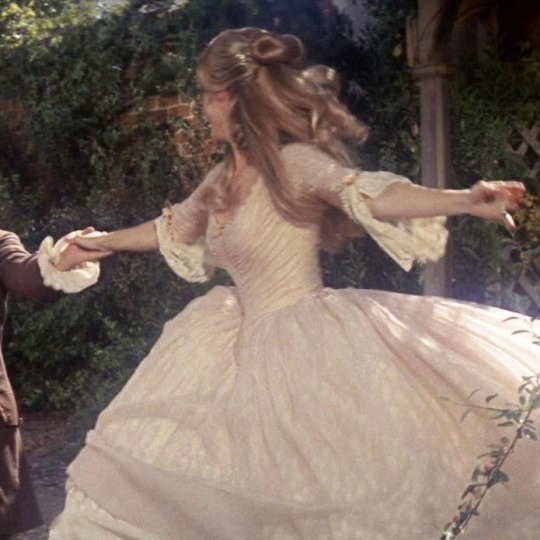
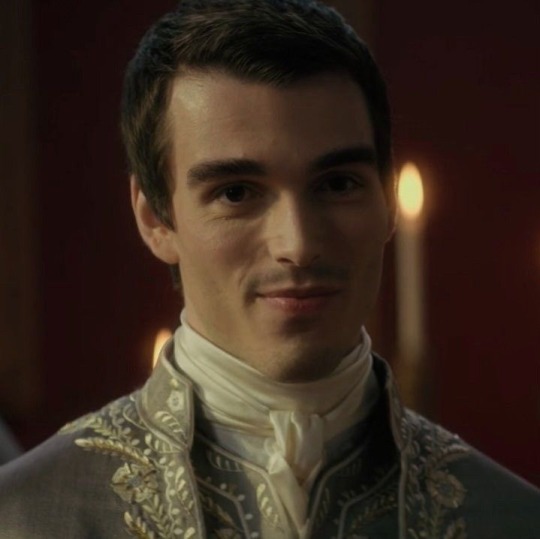
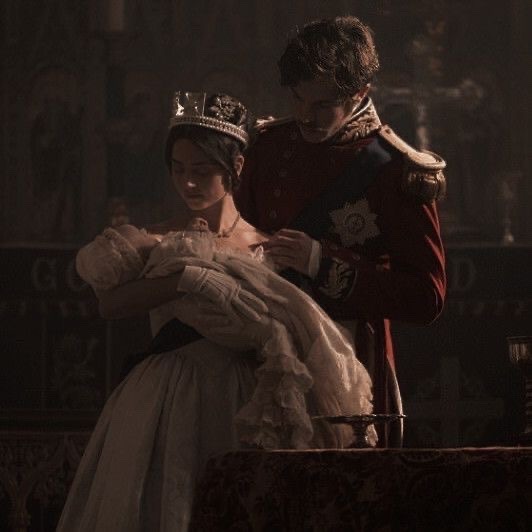
pairing: king george iii x fem!queen!reader
summary: your new life of being queen has been quite a struggle adjusting to. thankfully, you have the perfect king to stand right by your side.
genre: royal!au, fluff, mentions of arranged marriage, reader said to be a princess from france but ethnicity is not specified, plot kind of differs from queen charlotte: a bridgeton story, talk of wanting children
author’s note: the plot is different from that of the netflix series so don’t come at me ! wanted to write for george because his character is very intriguing to me and also bc the actor for young george is so mighty fine 😋😋 enjoy!

“Are you alright?” The king asked you. His face examined yours, locking his eyes onto your frame.
“Yes my king,” you say, staring down at your plate with a forced smile. In all truths, you were not alright. You had just wedded the week before, and the life of a queen was taking much more of a toll on you than you’d expect.
You remembered like it was just yesterday. Well, technically, it was. It was barely a week ago.
“Will Her Royal Highness, Princess of France, take His Majesty, The King as husband, from this day forward; for better, for worse, for richer, for poorer, in sickness and in health, to love and to cherish, till death do you part; according to God's holy law?”
“I, Princess of France, in the presence of God make this vow, from this day forward; for better, for worse, for richer, for poorer, in sickness and in health, to love and to cherish, till death us do part; according to God's holy law.”
“Very well, you may kiss the bride.”
And just like that, you were proclaimed Queen of Great Britain and Ireland.
“You’re spacing out,” George inquires, face filled with concern. You almost wonder why he cares. The two of you were not inlove. The marriage had been an arranged deal between your father and his since the day you were both born. Your fate had been sealed as soon as you came out your mother’s womb.
“Leave us.” He motions to the guards standing. They obey him like robots, leaving at his command. Now, it was just the two of you alone.
“YN,” for the first time since the two of you met, he had said your first name. No ‘my queen’ but just YN.
“Yes, my king?”
“Please, just George.”
You sigh, finally deciding to look him in the eyes. “Very well. George?”
“You know you can always tell me what is wrong, right?” He looks almost saddened. Or was it pity? You didn’t know him very well—the two of you rarely communicating since the marriage had been finalized.
“Of course my king,”
“George.” He corrects.
“Apologies, it was out of habit.”
He stands up, motioning you to come over to him. With raised eyebrows, you do as he wants, your long gown flowing onto the marble floor beautifully.
“Come with me,” he says, taking your hands into his. “To our chambers.”
You flush up at the feeling of George’s hands holding yours. You hadn’t had a boyfriend before marrying him, your father being very keen on keeping yourself innocent and pure for the King of Great Britain.
When you two arrive at the large tall entrance of the chamber, George waves off the two guards standing in front.
“Marital duties?” One of the dukes asked. “Great job Georgie, knew you had it in ‘ya.”
The King rolls his eyes at this, though he makes sure the duke hadn’t caught it. When you’re both inside the chamber, George finally lets out a breath of relief, situating himself onto the large mattress.
It was even larger than yours back at your palace in France. It was meant for the King and Queen, you and George, to sleep in at night and perform your marital duties.
“Sit, please.” George says, patting the empty space next to him. You sit down awkwardly, not sure where to look.
“Listen, I know it’s hard,” George lifts up your chin with his finger. “Adjusting to your life as my queen. The Queen of Great Britain and Ireland. But I assure you, as long as I live, I will make sure nobody will ever lay their hands on you or our future children, and that I will provide you with my love and support as I do with our country.”
Your eyes softened at his mini speech towards you, and your heart fluttered with joy. You were scared the two of you would end up in a loveless marriage like your Father and Mother had been—only together to provide the next heir of France. The heir ended up being your brother, your parent’s firstborn, King Charles of France. Second in throne was your other brother, Prince Louis, the spare. The only reason your parents had you was because your father had wanted a daughter to spoil, not because they were “inlove”. God no.
“Thank you my king. I appreciate this greatly, you have no idea. The stress of being Queen has taken quite the toll on me, and I was afraid of confiding in you about my worries.”
“You have no reason to be afraid,” George takes your hand, placing a soft kiss on it. “You are my wife, and I am your husband. You should never be afraid to confide in me. We promised that only death can do us part, and that we will love each other in sickness and suffering.”
“You are right my king,” you say, placing a peck on his cheek. For the first time, you were making a move, not him.
The two of you stay in each other’s embrace for the next hour, a comfortable and comforting silence fulfilling you both.
For the first time since you’ve step foot into Britain, you felt safe and loved. Loved by the King himself.
“You mentioned protecting me and our future children?” You tease him as you pull away. He bashfully looks down, letting out a small embarrassed laugh.
“Yes, my queen. The future heir, our lineage.”
“I hope it’s a boy,” you blurt out. You wanted your firstborn to be a boy because you’ve always seen your big brothers as a clear example of well raised princes, and you wanted the same for your future children.
“A boy would be ideal,” George says, pulling you close to him, “but I wouldn’t mind a girl. Spoil her rotten and braid her hair.”
You laugh, nodding along with George’s words. “I suppose a girl wouldn’t be so bad. As long as our future baby will be healthy.”
“Yes.”
The next few hours are spent with you and George mapping out the future, forgetting all your responsibilities for just the moment. George wanted Edward for a boy and Marionette for a girl, Nette for short. He expressed to you how he always dreamed of a normal life, farming and doing astronomy. However, he was grateful for growing up in royalty, never surrounded by poverty.
And just like that, the night you and George connected had flew by and you were expecting your second child in a few weeks time.
“Edward!” You say, giggling at the boy running around your legs. Edward was five, and quite the rowdy one. He took after his father’s handsomeness and had the eyes of George, the same ones that had looked at you with concern 6 years prior on that fateful night.
“Mummy!” Edward shrieks in delight. His eyes brighten when he sees his Father, who picks him up in an instant.
“I hope you’re not giving mummy a hard time,” George says, booping the young prince’s nose. “Are you, Prince Edward of Wales?”
“Course not daddy!” Edward scrambles to be let down on the ground, making George grunt as he sets the boy down. “Just wanted to hang out with mummy, that’s all.”
“Yes, my handsome little prince was doing no harm dear,” you reassure your husband. He rubs your baby bump softly, admiring your beauty.
“Just worried about you and Marionette is all,” he says with a soft smile.
“Me and Nette are fine,” you say, “now Edward, would you like me to tell you the day I became Queen?”
“Yes mummy!” Edward grins excitedly.
George can’t help but admire his little family as you told the story to your son Edward, brushing small strands of his brunette hair out of his face. In a few weeks, little Marionette will be arriving, and he couldn’t wait.
He wouldn’t trade what he had now for anything, not even for the whole wide world.
#king george iii#king george bridgerton#king george iii x reader#king george iii imagines#queen charlotte bridgerton#queen charlotte: a bridgerton story#king george x reader#king george smut#king george iii smut#king george#bridgerton x you#bridgerton x y/n#bridgerton x reader#bridgerton x female reader#bridgerton imagine#bridgerton#bridgerton fanfiction
5K notes
·
View notes
Text
Morrigan, Nesta, and the Hewn City
A number of readers don't see why others find Mor to not be a "girl's girl" type of character. SJM's narrative had her welcome Feyre with open arms, but Mor's reaction to and treatment of Feyre differs greatly than with others.
To start off, let's look at Mor's relationship with Nesta. They had a disastrous first interaction, and it immediately put Mor at odds with her.
Some readers say they didn't notice any nastiness on Mor's end, but you just have to look at the text to see that's not true.
Some readers excuse it as Mor treating Nesta that way to defend Feyre and Cassian, but Mor treated Nesta in a way that overstepped only worrying about friends.
If it was about Feyre, well Feyre always checked Rhys when he disparaged Nesta. Mor could have taken the lead from that. Feyre forgave Nesta for their past, wanted to move on, and that was family business between the sisters.
If it was about Cassian, Mor had no business getting between them either. Feyre wondered if they were mates since ACOWAR, so others likely wondered too. That's a situation best left to the possibly bonded. Mor wasn't in a relationship with or in love with Cassian, she was just using him as a buffer with Azriel.
For examples of poor treatment, there are many that show Mor was rude and irrational when it came to Nesta.
The first time they interacted isn't the 'Nesta is just a bitch' situation it's made out to be. Some readers say Mor was only being friendly, was just trying to be welcoming of Nesta, but that isn't a take supported by the text.
“Where did that dress come from?” Mor said, red gown flowing behind her as she breezed toward Nesta. My sister drew up short, shoulders tensing, readying to— But Mor was already there, fingering the heavy blue fabric, surveying every stitch. “I want one,” she pouted. Her attempt, no doubt, to segue into an invitation to shop for a larger wardrobe with me. [Mor conversing with Feyre about Rhys picking the dress] “He gets all the credit for clothes,” Mor said, examining the fabric of Nesta’s skirt while my sister monitored like a hawk, “and he never tells me where he finds them. He still won’t tell me where he found Feyre’s dress for Starfall.” [...] “It’s a good thing we’re not the same size—or else I might be tempted to steal that dress.” “Likely right off her,” Cassian muttered. Mor’s answering smirk wasn’t reassuring. (ACOWAR, Ch. 17)
This was not very long after Nesta and Elain were thrown into the Cauldron. In reality, Mor's behavior was inconsiderate and insensitive of someone who recently had their bodily autonomy violated.
Invading her personal space.
Grabbing her dress up.
Ignoring her verbally before finally acknowledging her.
Smiling at a joke about stripping her.
It isn't something you'd expect from a character who, according to SJM's narrative, is supposed to be sensitive to victims. The interaction wasn't about complimenting Nesta, because Mor knew the dress was given to her. She asked Feyre about it. This wasn't simply a friendly encounter. Nesta acting how she did with Mor was not starting an uncomfortable situation – it was reacting to a situation that was already uncomfortable for her.
After the IC got back from a battle, Nesta asked them where Cassian was. Instead of simply answering, Mor went off on her.
And Nesta had been … pacing in the foyer. As if she was worried. I opened my mouth, but Mor beat me to it. “He’s busy.” I’d never heard her voice so … sharp. Icy. [...] if the Illyrian warrior no longer stood as a physical and emotional buffer between her and Azriel … And worse, if the person who caused that vacancy was Nesta … Mor said flatly, “When he gets back, keep your forked tongue behind your teeth.” My heart leaped into a furious beat, my arms slack at my sides at the insult, the threat. But Rhys said, “Mor." (ACOWAR, Ch. 39)
Another time, Mor tried to interrupt a conversation Cassian and Nesta were having, which was in no way hostile. It wasn't like she was trying to defend Cassian or anything; she was just being territorial.
Mor sagged a bit, jewelry glinting with the movement, and went to take Cassian’s arm. But he’d at last approached Nesta. And as the world began to turn to shadows and wind, I saw Cassian tower over my sister, saw her chin lift defiantly, and heard him growl, “Hello, Nesta.” Rhys seemed to halt his winnowing as my sister said, “So you’re alive.” Cassian bared his teeth in a feral grin, wings flaring slightly. “Were you hoping otherwise?” Mor was watching—watching so closely, every muscle tense. She again reached for his arm, but Cassian angled out of reach, not tearing his eyes from Nesta’s blazing gaze. (ACOWAR, Ch. 42)
Another time Nesta worried about Cassian, Mor rudely sent her on her way after Feyre said he was ok.
Nesta stood by the nearest tent, an empty water bucket between her feet. Her hair a damp mess atop her mud-flecked head. Watching us emerge, grim-faced— “He's fine. Healed and awake,” I said quickly. Nesta’s shoulders sagged a bit. She’d saved me the trouble of hunting her down to ask her about tracking the Cauldron. Better to do it now, with some privacy. Especially before Amren arrived. But Mor said coldly, “Shouldn’t you be refilling that bucket?” (ACOWAR, Ch. 27)
The comments Mor made in ACOSF are particularly bad.
The first is when she was having brunch with Cassian, where she brought up Nesta unprompted, was snide about her, then outright callous.
“She’s settled, then?” Cassian knew who she meant. “Taking a nap.” Mor snorted. “Don’t.” His attention drifting to the glittering Sidra mere feet away. “Please don’t." Mor sipped her tea, the portrait of elegant innocence. “We’d be better off throwing Nesta into the Court of Nightmares. She’d thrive there.” (ACOSF, Ch. 4)
Mor knows more than anyone how a "difficult" woman would absolutely not thrive in a sexist society. It was actually a ridiculous statement to make. Nesta's whole reason for being sent to the House of Wind and training was because the IC considered her "out of control". Feyre straight up admitted it.
Mor was projecting her abuser onto Nesta, when Nesta is not comparable to Keir. In fact, she is more comparable to Mor. She was drinking excessively, which Mor does too, often taking full days to recover. Nesta was shamed for having meaningless sex, but Mor will have sex with someone she doesn't even like to put off Azriel, rather than have an honest discussion with him.
The second time Mor made comments was in Windhaven camp, where she didn't actually have to be. She doesn't rule over it, nor was she involved in Nesta's training. I wondered why she was even there when she hates it so much.
Mor’s face was pale, tight. “I hate this place,” she said under her breath, the heat of it clouding the air in front of us. “It should be burned to the ground.” (ACOMAF, Ch. 45)
It seemed like Mor just came to get into Nesta's business. She taunted her 'quietly' because she didn't want Cassian hearing.
No amusement lit Morrigan’s face as she shifted her attention down to Nesta. “Why aren’t you out there?” “I’m taking a break. Morrigan’s gaze swept over Nesta’s face, noting the lack of sweat or flushed skin, the hair barely out of place. The female said quietly, “My vote would have been to dump you right back in the human lands, you know.” (ACOSF, Ch. 6)
The human lands, where Nesta would have to live in hiding at risk of human prejudice and violence. How is anything Nesta did deserving of that? An abrasive personality and having bad coping mechanisms for PTSD deserves living in danger 24/7?
Dark fire simmered in Morrigan’s eyes. “I knew plenty of people like you once.” Her hand drifted to her abdomen. “You never deserve the benefit of the doubt that good people like him give you.” (ACOSF, Ch. 6)
Again, this is wild projection. It's an unkind take on someone who is suffering from depression and does not want to have her life completely controlled.
Something to notice, is that the times Nesta lashed out in ACOMAF and onward were mostly in reaction to the IC crossing her boundaries. In reality, Nesta wasn't as bad as Mor made her out to be. She was essential to the war effort, helped in every aspect (diplomacy, strategy, battle, in the camps) because she actually does care about people – but Mor gave her no credit for it.
When Cassian approached them, we learned that Mor, who winnowed him and Nesta, had come early.
Cassian had reached them, breathless and gleaming with sweat. “You’re early.” “I wanted to see how things were coming along.” Morrigan pulled her burning gaze from Nesta. “Seems like today was a slow start.” (ACOSF, Ch. 6)
So she did just come to be in Nesta's business and make spiteful comments. Some mean girl energy there. Ironic when certain readers say Mor disliked Nesta for being that way.
Mor did end up coming around to being nicer to Nesta, though. We weren't given her reasoning over it, but I'm positive it was because of Nesta encouraging the priestesses to come out of their shells and train to be Valkyries. In my opinion, Mor realized she had been harsh on Nesta and that calmed her down. Also, I think the IC having Nesta distract Eris made Mor feel sympathy, probably seeing how similiar they actually were and all that. So Mor stopped coming between Cassian and Nesta, and secretly taught him to dance so he could surprise Nesta.
Some readers question if Nesta would have been receptive to Mor even if she had been welcoming. An example to look to is Azriel and Nesta – they were perfectly fine because he minded his own business concerning the Archeron sisters and Cassian's possible relationship with Nesta. Nesta was even friends with Amren until they had their falling out, which only happened because Nesta didn't want to train her powers.
So that's one relationship with a person Mor was disinclined to like based on her friends. Let's look at others, who are outside Mor's circle in Velaris — in the Hewn City.
“As my Third, Mor is my … court overseer. She looks after the dynamics between the Court of Nightmares and the Court of Dreams, and runs both Velaris and the Hewn City. I suppose in the mortal realm, she might be considered a queen.” (ACOMAF, Ch. 18)
Mor has a direct hand in running the Hewn City, but she barely goes. Her experiences of having been from there understandably traumatized her. Even just the thought of a pending IC trip distresses her.
But she’d left after dinner, pale-faced and jumpy, ignoring Cassian’s attempt to speak with her.
“Why did Mor look so disturbed [...] ?” ( ACOMAF, Ch. 41)
Yet Mor having trauma doesn't make her think of what other daughters of the HC have gone through and are still being subjected to by male relatives or even Keir himself.
Keir paused at the threshold as the doors opened on a phantom wind. He said to Rhys, perhaps the closest he’d come to asking for permission to leave, “Lord Thanatos is having … difficulties with his daughter again. He requires my assistance.” Rhys only waved a hand, as if he hadn’t just yielded our city to the male.
After Rhys' deal with Keir to let HC folk into Velaris, all Mor cared about was Keir.
She waved a hand to the town house, the city. “This is my home, and you are going to let Keir destroy it.”
“I took precautions,” Rhys said—an edge to his voice I had not heard in some time. “Many of them. Starting with meeting with the governors of the Palaces and getting them to agree never to serve, shelter, or entertain Keir or anyone from the Court of Nightmares.”
“They have been sending out the word to every business owner in the city,” Rhys went on, “every restaurant and shop and venue. So Keir and his ilk may come here … But they will not find it a welcoming place. Or one where they can even procure lodgings.”
(ACOWAR, Ch. 27)
There was no thought from Mor about all the innocents who could benefit from being outside the HC, who should be able to have time not being trapped inside a mountain with their abusive relatives and Keir.
Some readers say Mor's actions against Nesta are about having principles, about defending Feyre from an abusive relative—but Mor never does that for anyone else.
The IC and Mor act like she is the only innocent, the only 'dreamer' from the HC. She is in a position to help others suffering like she had suffered—but she does nothing about it. People could be freed from an oppressive system if Mor and Rhys took Keir out of the picture, for Mor to step into his position. But they let Keir stay in charge, keeping that system in place. It's hypocritical on Mor's part to be so hostile to Nesta if her reason is about defending a victim. The IC as a government lets girls and women in 2/3rds of their court suffer oppressed lives of victimhood and they do nothing to help them.
153 notes
·
View notes
Text
an aventurine analysis—(most of) the references in his character.
i thought i'd compile this information on here in case someone else might be interested in this!! enjoy!! if i missed anything, do let me know in the comments. ♡♡

aventurine's light cone is called "inherently unjust destiny". an "inherently unjust destiny" refers to a situation or outcome that is fundamentally unfair or biased from the start. it implies that the factors determining one's fate are intrinsically unequal, leading to inevitable injustice. this phrase is often used in discussions about societal structures, where certain groups might face systemic disadvantages that predetermine their outcomes, regardless of their actions or efforts.
the name kakavasha means the cry of a young crow in sanskrit.
kakavasha was born on the kakava festival, held by romani people on may 5-6.
the name aventurine is based off the aventurine stone, which represents opportunity and luck.
aventurine's banner is called gilded imprisonment, which refers to a situation where an individual is trapped in a seemingly comfortable or privileged environment, but in reality, their freedom and autonomy are restricted. this term is often used to describe scenarios where the outward appearance of luxury or advantage masks the underlying lack of true liberty or choice. the concept can be applied to various contexts, such as relationships, employment, or societal roles, where the benefits or status conferred upon an individual come at the cost of their freedom or well-being.
aventurine's quest is called “all the sad tales,” which could refer to “All the sad Young Men” by F. Scott Fitzgerald—a collection of short stories. i've summarized all of them below:
The Rich Boy an upper-class man, Anson Hunter, is emotionally distant and incapable of deep love. despite several relationships, including a significant one with Paula Legendre, his arrogance and fear of commitment leave him alone and regretful. Winter Dreams Dexter Green, a working-class young man, falls for the beautiful but fickle Judy Jones. he builds a successful life in pursuit of her, only to realize later that she has married and lost her charm. the story reflects themes of unattainable dreams and disillusionment. The Baby Party John and Edith Andros take their daughter to a children’s party, where a minor conflict between kids escalates into a physical fight between their fathers. the story highlights adult immaturity and the fragility of pride. Absolution a young boy named Rudolph Miller struggles with guilt and strict religious expectations. after confessing a minor sin, he receives harsh punishment from his father, leading him to question morality. the story serves as a thematic prelude to The Great Gatsby. Rags Martin-Jones and the Prince of Wales a wealthy woman, Rags, is pursued by a mysterious and seemingly noble man, who turns out to be an imposter. the story critiques social pretensions and the illusions of high society.
The Adjuster a woman named Luella, who believes she deserves happiness without effort, is advised by a psychiatrist to embrace life’s hardships. the story explores self-delusion and personal growth. Hot and Cold Blood two men reflect on a failed business venture and how their differing personalities—one cold and calculating, the other passionate—led to their downfall. the story examines human nature and success.
The Sensible Thing George O’Kelly, an ambitious but struggling man, is rejected by his love, Jonquil, due to financial instability. after achieving success, he returns to her, only to find their love has faded. the story mirrors themes of lost innocence and changing emotions.
Gretchen’s Forty Winks a husband, Roger Halsey, feels neglected when his wife, Gretchen, prioritizes her beauty sleep. His jealousy and insecurity lead to comedic misunderstandings, revealing the absurdity of marital tensions.
in the cn dub, aventurine's quest is titled “dance in the slaughterhouse,” which refers to “Dance in the Slaughterhouse,” a novel by Ed McBain. [spoilers ahead] in this novel, detectives from the 87th Precinct investigate a snuff film, uncovering a dark network of violence and sexual exploitation. as they track the killers, they face corruption and danger, leading to a tense and gritty conclusion.
when we switch to aventurine's pov in the penacony quest, it's is called danse macabre. the "danse macabre," also known as the "dance of death," is an artistic and literary motif that emerged in the late Middle Ages. it depicts the universality of death, illustrating the idea that death comes for everyone, regardless of their social status or position in life. the motif typically features skeletons or personifications of death leading people from all walks of life—such as kings, popes, peasants, and children—in a dance toward their graves. the danse macabre serves as a reminder of the inevitability of death and the transient nature of earthly life. it was often portrayed in murals, prints, literature, and music. one of the most famous representations is the fresco in the Cemetery of the Holy Innocents in Paris, created around the early 15th century. this theme became particularly popular in times of plague and social upheaval, reflecting the widespread presence of death and the shared human experience of mortality.
— on a similar note, when we switch to aventurine's pov, we see a question right under danse macabre. the translation is “Quo Fata Ferunt?” which literally means, “Whither the Fates Carry (Us)?” the motto appears on Gibraltar’s coat of arms, granted by Spain’s Catholic Monarchs in 1502, before the British took control of the territory in 1704.

eidolons:
eidolon one; prisoner's dilemma: it is a game that demonstrates why two people might not cooperate, even if it's in their best interest. in the game, two players are arrested and interrogated separately. each has two choices: to cooperate with their partner by staying silent or to betray their partner by confessing. the outcomes are:
if both stay silent, they get a light sentence.
if one betrays and the other stays silent, the betrayer goes free and the silent one gets a heavy sentence.
if both betray, they both get moderate sentences.
the dilemma arises because while mutual cooperation yields a better overall outcome, individual incentives lead both to betray, resulting in a worse outcome for both.
eidolon two; bounded rationality: it is a card game that simulates the decision-making process under constraints. in this game, players must make choices based on limited information, time, and cognitive resources. the aim is to replicate real-world scenarios where individuals cannot consider all possible options or outcomes. the game involves making trade-offs and prioritizing certain actions, reflecting the concept that people use "bounded" rationality rather than perfect rationality when making decisions.
eidolon three; droprate maxing: droprate maxing is a strategy used in games, particularly in those involving loot or collectible items, where players aim to maximize their chances of obtaining rare items. this involves optimizing various factors that affect drop rates, such as choosing the best locations to farm, using specific equipment or bonuses that increase drop chances, and repeating actions that yield the best rewards. the goal is to make the most efficient use of time and resources to get the desired items as quickly as possible.
eidolon four; unexpected hanging paradox: it is a logic puzzle involving a surprise event. for example:
a judge tells a condemned prisoner that they will be hanged at noon on one weekday (monday to friday), but the hanging will be a surprise. the prisoner won't know the day until the morning of the hanging. the prisoner reasons:
- if the hanging is on friday, they would know by thursday night, so it can't be friday.
- if it's thursday, they would know by wednesday night, since friday is ruled out, so it can't be thursday.
- by this logic, they rule out each day, concluding the hanging can't happen at all.
despite this reasoning, the prisoner is hanged on a day they don't expect, making the hanging both surprising and logical.
the paradox arises because the prisoner's logical deduction leads to a conclusion that contradicts the judge's initial statement.
eidolon five; ambiguity aversion: it is when people prefer known risks over unknown risks. in simple terms, if given a choice between a bet where they know the exact odds of winning and a bet where the odds are unclear, most people choose the one with known odds, even if both bets might have the same potential payoff. this happens because people feel more comfortable and secure when they know what to expect.
eidolon six; the stag hunt game: it is a game that illustrates a situation where cooperation and trust between individuals lead to better outcomes, but there's a risk involved. for example:
two hunters can either hunt a stag (deer) together or hunt rabbits alone.
hunting a stag requires both hunters to cooperate; if they succeed, they both get a large reward.
hunting rabbits can be done alone, and each hunter gets a smaller, but guaranteed reward.
if one hunter goes for the stag and the other hunts rabbits, the stag hunter gets nothing, while the rabbit hunter gets a small reward.
the game shows the dilemma between choosing a safe, smaller reward (hunting rabbits) or risking cooperation for a larger reward (hunting a stag). it highlights the importance of trust and cooperation in achieving the best outcomes.
achievements related to aventurine:
when we witness kakavasha's story, we get the achievement "Sibyl, what do you want?" the phrase "Sibyl, what do you want?" originates from T.S. Eliot's poem "The Waste Land," specifically in the epigraph at the beginning. the full epigraph, translated from Latin, is:
"For I myself saw with my own eyes the Sibyl at Cumae hanging in a jar, and when the boys said to her, 'Sibyl, what do you want?' she replied, 'I want to die.'"
this passage references the Sibyl of Cumae, a prophetic figure in Roman mythology who was granted immortality by the god Apollo but not eternal youth. as a result, she grew older and more withered over time, longing for death as a release from her endless, decrepit existence.
the epigraph serves to set the tone for "The Waste Land," a poem that explores themes of decay, disillusionment, and the search for meaning in a fragmented, modern world. the Sibyl's desire for death reflects a sense of despair and futility, which resonates with the broader themes of the poem.
how is this related to aventurine? well, for one, kakavasha's life revolves around death. it would surprise nobody if all he knew at this point would be death. he has been granted a life that could be described as a 'dream' by many, but for him, quite like the Sibyl of Cumae, it could only be a curse. his loss of innocence is also expressed in this line.
upon defeating aventurine's boss, we get the achievement "she replied, ‘i want to die,’" which is a continuation of the previous achievement ("sibyl, what do you want?"), and the sibyl's response, and in this case, also aventurine's.
combat abilities/traces:
(technique) the red and the black: “The Red and The Black” is a novel by Stendhal. [the paragraph summarizes the red and the black, so spoiler warning.] it follows Julien Sorel, a poor but ambitious young man in 19th-century France. he becomes a tutor and has an affair with Madame de Rênal, which forces him to flee to a seminary. later, he gains favor with the aristocratic Marquis de la Mole and begins a passionate affair with the marquis’s daughter, Mathilde. when his past is exposed, he attempts to kill Madame de Rênal, is arrested, and sentenced to death. in prison, he rejects his past ambitions and accepts his fate. Mathilde mourns him, while Madame de Rênal dies of grief.
— peaceful calm: refers to a state of deep tranquility and serenity, where there is an absence of stress, agitation, or disturbance. It's a feeling of inner stillness and relaxation, where both the mind and body are at ease. In this state, one may feel grounded, clear-headed, and free from worry or tension.
— still water runs deep: the latin "still waters run deep" is a proverb with latin origins that suggests that a calm and placid exterior often conceals deep thoughts, emotions, or complexities beneath the surface. it implies that individuals who appear quiet or reserved may possess significant depth, wisdom, or intensity that is not immediately apparent.
— pouring rain: i am still a bit confused about this, but there are two possibilities. it could refer to “In Red Earth and Pouring Rain” by Vikram Chandra, a wounded monkey avoids death by telling an epic tale. His story follows Sanjay, a poet in colonial India, as he navigates love, war, and rebellion. Meanwhile, modern-day characters in California explore identity and belonging.
the other possibility is that it refers to the rain that fell on Sigonia-IV on aventurine's birthday.
(thank you @roxirinart for pointing out this possibility!!) for the 'pouring rain' reference, if it's not referring to anything deeper, it could refer to the act of 'making it rain'—a phrase that means throwing out cash in the air, usually at strip clubs, but it's sort of a slang nowadays for indulgently spending large amounts of money in a lavish or extravagant way, which fits the way his skill is a slot machine hitting the jackpot and how he 'makes it rain' in his ult as well. the pouring part could simply be to emphasize how much money it is (instead of 'drizzling' rain it's 'pouring' rain, which just means it is constantly raining, so a lot of money), or could be a reference to 'when it rains, it pours'—when one bad thing happens, other bad things tend to follow/come with it—which certainly fits how aventurine went through a massacre (in the rain) and proceeded to live a whole life of horrifying 'misfortunes' afterwards.
(shield) fortified wager: a "fortified wager" generally refers to a bet or gamble that has been strengthened or supported in some way. the term isn't widely used, but in this context, 'fortified' suggests that the wager has been enhanced or protected—perhaps through additional safeguards, resources, or strategies. for instance, in gambling or sports betting, a "fortified wager" could mean a bet that has been bolstered by better odds, insider knowledge, or some form of assurance, making it a stronger or less risky bet than it would have been otherwise. it might also involve combining bets or using betting strategies that minimize risk.
blind bet: it refers to a forced bet in poker (and some other card games) that players must place before they see their cards. it’s typically used to ensure there’s money in the pot right from the start of a hand. there are usually two types of blinds in poker:
small blind: a smaller bet placed by the player to the immediate left of the dealer.
big blind: a larger bet placed by the player two seats to the left of the dealer.
these blinds rotate around the table, ensuring everyone contributes over time. the players who place the blind bets are at a slight disadvantage since they must bet without seeing their cards first, thus the term 'blind.'
leverage: it is the ability to influence situations or people so that you can control what happens.
hot hand: it is a phenomenon, previously considered a cognitive social bias, that a person who experiences a successful outcome has a greater chance of success in further attempts.
bingo: it is a game of chance using cards on which there is a grid of numbers, a row of which constitute a win when they have been chosen at random. bingo is one of the most popular forms of low-priced gambling in the world.
#hsr aventurine#aventurine honkai star rail#aventurine#honkai star rail#dr ratio#hsr#iloveaventurine#character analysis#references#aventurine x dr ratio#aventurine x reader#aventurine analysis#aventio#aven
143 notes
·
View notes
Text
Some Matt Murdock fic recs because I've realized I don't promote him as much as Jason Todd :P
@ijustreallylovedaredevil has some good Matt-centric fics. The Murdock Mystery (Redux) A crossover fic with House M.D. Matt gets admitted to the hospital after mysteriously passing out, and for once it's not because of his nightly activities! At least in this one, it's not. It's a rewrite fic of the same premise, but different causes, so it was a very entertaining read. Not Your Damsel. Another one of those fics where Matt gets saved by the Avengers as his civilian persona in different scenarios. Natasha is the only one who knows, and fics the whole thing funny as hell. Faithful Unto... Matt gets shot by a cop while as a civilian. Warning for police brutality. It's a really good fic.
Our Daily Bread by torrential. Matt becomes a baker and opens up a bakery instead of becoming a lawyer. It becomes extremely popular to the point that the heroes and vigilantes of New York have taken interest in it.
Matt Murdock vs the Media by @jeannetterankin. Super funny fic of Matt Murdock accidentally becoming a media sensation by thwarting a villain's plan while in his civilian persona. Go read it, it's short but great.
@prettybirdy979 has a couple good ones that involve Matt meeting the Avengers in hilarious scenarios. Not All Those Who Wander Are Lost (But Matt's Not Wandering; He's Just Lost) Matt gets lost in Avengers Tower while on the way to a meeting with Stark's lawyers. Very funny. Look the Devil in the Face The Avengers think Matt is the actual Devil. Hilarity ensues. My Guardian Avengers (Can I Get a Refund?) has the Avengers trying to protect Nelson, Murdock & Page law firm from someone that's trying to get them to drop a case they're working on. Matt gets very irritated from the constant interventions.
Matt Murdock is a Really Good Lawyer by Seagull18. A two-shot series of Matt being a Really Good Lawyer. First fic has him helping out various Avengers stuck in legal situations as Matt Murdock. When asked how he's so good, he uses the same excuses of being a really good lawyer. The second one has Matt's perspective of No Way Home after claiming that his excuse works every time.
Shadowboxing by @thekristen999. Steve boxes at the same gym Matt does at night, and they become friends.
Garbage Day by @frownyalfred. This is technically Jason Todd-centric, but it has him meeting Hawkeye and Daredevil after he got beat up and thrown into the same dumpster the former two were in.
What Almost Was by spaghettixday. Bit of a sad one, but it's a 5+1 fic where 5 different families tried to adopt Matt and the one time the Nelsons succeeded.
They Do It With Mirrors by Prochytes. The Defenders get trapped in the Mirror Dimension by Dr. Strange for forced bonding time. They can only escape by working together.
it's cold out here in the trees by @deniigi. Matt gets asked to be interviewed about his dad for a documentary. A wonderful angst-filled introspection of Matt's relationship with his father.
Cousins AU by @sammyheroes. Fun little AU of Matt and Peter being cousins, and how that relationship influences some of Spidey's development in the MCU.
JJ and DD walking into a knitting shop by @orangechickenpillow. Matt and Jessica Jones end up bonding while knitting. Based off the behind the scenes photo of the two character's actors knitting while on set.
Blind Catholic Ninja Orphan by @loving-jack-kelly. Matt becomes a meme on the Internet when someone makes a tweet reminiscing about smol blind Catholic orphan Matt Murdock dealing out crazy ninja moves. It spirals from there.
The Devil You Know by Beguile. Matt gets taken, and the Defenders are the ones that have to rescue him.
Murdocks Never Quit by Lluvia_Heroes (Lluvia185) and Pikkulef. Instead of dying outright, Jack Murdock was in a coma for 20 years. He ends up waking up, much to Matt's delight, but now they have to come to terms with many things.
Cross-Examination by @ceterisparibus116. You've probably heard about the author from their post-No Way Home fic where Peter is helped by Matt, Hope (which you should also read). But I loveeeee their one-shot of Matt being a lawyer. It's short but amazing, and if you're someone that wants a glimpse into the more legal side of Matt's character, go read this fic. Ceteris is also a lawyer, so that's why this fic is so phenomenal.
#matt murdock#fic recs#daredevil show#daredevil#nmcu daredevil#netflix daredevil#daredevil comics#matthew murdock#marvel#mcu#nmcu#marvel netflix
144 notes
·
View notes
Text
"But be safe. No reckless stunts."
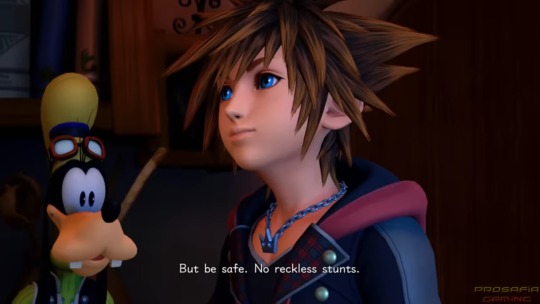
On Sora and Riku's respective recklessness as showcased in the series, and what it means for their relationship
Under readmore because i am going to talk a lot
As an aside: Im going to be pulling from the Japanese text, though I am not a native speaker or really any kind of speaker, so take what I say with a decent amount of scrutiny. I'm more than willing to be corrected on these conclusions!
One line that has stood out to me in kingdom hearts is the repetition of "no reckless stunts!" and similar phrases. If you examine the original text, three slightly different words have been used to mean "reckless", which I'll include below (pulled definitions from Jisho, mostly)
無謀 (mubou): reckless, foolhardy, rash, ill-advised, mad (scheme)
無茶 (mucha): reckless, absurd, unreasonable, ridiculous
無理 (muri): impossible, unreasonable, unjustifiable
Importantly for what i want to talk about is how "muri" is used in situations where a character wants to express that something is impossible (think of a character giving up all hope due to an insermountable obstacle in front of them, they may mutter something like "muri da...") keep a pin in this, it will matter toward the end.
Also note that each of these words starts with "無" (mu), which usually means nothingness or absence of something. The definition of this kanji isnt super important, it's more important that its presence ties these three phrases together in a really unique way as i hope to demonstrate.
what i propose is that both Sora and Riku are depicted as reckless characters, albeit in different ways. The established pattern I've noticed is that Sora: "mucha" & Riku: "muri". I will tentatively refer to "mucha" as "rash" and "muri" as "impossible" (despite that it does also mean other things in some cases! bare with me it'll make sense)
Dialing back a bit, we have seen countless moments of Sora acting rashly. It is one of his key character traits and it tends to get him in trouble. He has a big heart, and is quick to anger.
Sora's response to loved ones and helpless innocents that have been put in harm's way is to repetitively bash things with his keyblade (and ask questions later).
It's Sora's rashness that allows Org 13 to use him to complete kingdom hearts. The extreme end of his rashness is showcased when he stabs himself to release Kairi from his heart.
Tldr. I think it's pretty well established and easy to argue that Sora is one to leap before he looks.
Now, Riku might be a little harder to sell as reckless, because of how well he tends to hide it. He carries himself as a role model for Sora, and tries to be the responsible friend. But if we look at his patterns of behavior, despite how he carries himself, he is quite reckless!
Without thinking of the consequences, he rushes the open door when destiny islands falls to darkness, eventually succumbing to it himself. He lashes out several times at Sora, particularly dangerously when he fires off a dark firaga in Hollow Bastion. He closes the door to darkness with Sora without knowing what would happen to him if he was trapped in the realm of darkness. When Sora is asleep, he sacrifices his form to defeat Roxas, without any assurance that he would ever be able to get his old form back.
We see Riku's recklessness too in the fight against Xemnas. He recklessly throws himself in front of Xemnas twice, hurling Sora away from danger and taking a very nasty blow to the hip. I'd count his dive to save Sora in DDD among these, mostly due to his risk taking behavior when it comes to saving Sora. Finally of course we see it in KH3, with his ultimate sacrifice. (but i think importantly, this scene isn't just recklessness, but I'll explain in a bit)
So tldr. Despite Riku's mask of level headedness and resolve, he has been shown over and over to take massive risks without caring for the consequences. Which is pretty reckless, in my opinion!
Sora and Riku's recklessness, mind you, is also called into question by Yen Sid, who tells Riku the reason he kept Aqua's fate a secret was to keep Riku and Sora from staging a "half-baked attempt at rescue"
He says similar in Japanese, but i want to just note the word he uses when he describes the rescue attempt as reckless (highlighted for ur convenience):
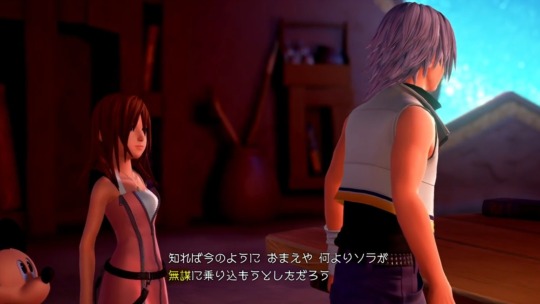
(the highlighted word here is "mubou", it will come back later in an Important way, so keep it in mind)
he's *basically* saying that if Riku, or worse, Sora, knew about Aqua, they would have recklessly marched into the realm of darkness to rescue her. Because he knows they are both ... Like that.
I would be remiss to not mention that Sora's impulsivity and recklessness is something Riku admires! After Yen Sid tells riku not to be rash, and Riku excitedly tells Mickey he's ready to help save Aqua, Kairi observes that Riku has changed, and he's more like Sora. Riku asks if that's a compliment, but I think it's clear that he feels it is. He says it's more Fun to just follow his heart, which is sora-esque. (;_;) This is also something he brings up to Sora when they're on the dark margin together, that he's jealous of how Sora can just follow his heart. It's clear Riku has started to embrace his more impulsive side, to follow his heart like sora does. This is important later!
So now that I have my premise Mostly set up, I'd like to highlight a handful of scenes that I thought were really telling about how Sora and Riku relate to the terms "mucha" and "muri", respectively.
Let's start with Sora and "mucha".
The first instance i have found "mucha" used is in Olympus Colliseum.
lets recall How Herc initially loses his power in KH2, and compare it to the movie.
In KH2, Herc is tricked into leaving the colliseum unguarded by capturing Meg and hiding her in the underworld so that Herc and Sora must go to her rescue. Hades sends a hydra in to destroy the colliseum while Sora and Herc are busy fighting heartless and Pete and rescuing Meg.
Upon seeing the destruction in the colliseum, Herc falls to his knees, and you can visibly see his colors fade to a more ashen complexion, similar to his appearance without his powers in the movie. He calls himself a piece of shit basically and Meg helps him up to limp to safety, leaving Sora to defeat the Hydra (ahem sora helping riku walk in twtnw after xemnas fight anyone)
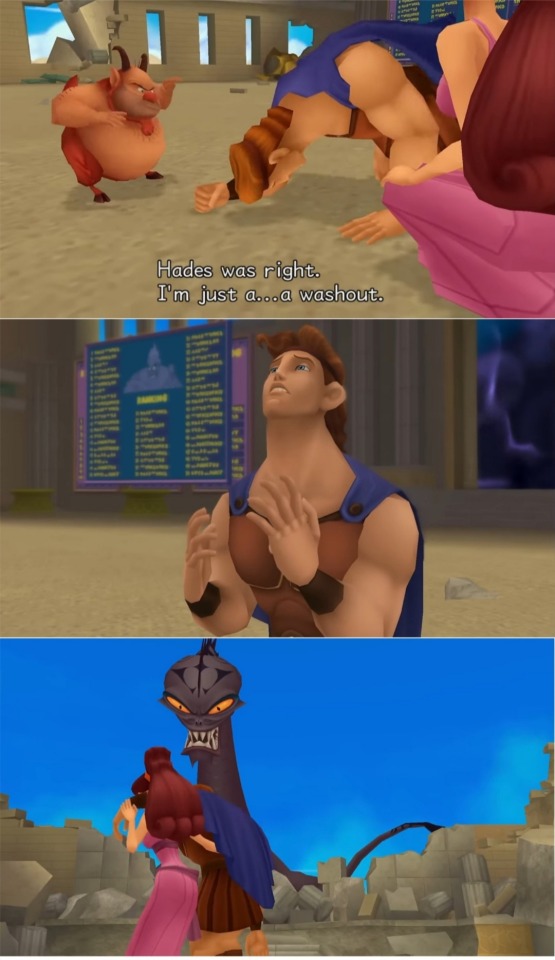
(Herc even has a second journal entry for his Desaturared form.)
You leave the world after defeating the hydra and jumping up on its back a few times, and after sora d & g are named true heros. Yay. But Herc doesn't have his power back yet, which will later be addressed in the second episode.
Herc's loss of power is much different from the movie. In the movie, he agrees to let Hades take his strength for a day in order to keep Meg from harm, and release her from the contract she had entered with Hades (iirc). This was all so Herc wouldn't get the chance to save Olympus from the titans that Hades revives in order to take Zeus' throne for himself.
Herc still tries to wonderboy his way into rescuing the town, and fights a giant cyclops. While he lacks physical strength and gets pretty much Pummeled, he ends up beating the cyclops with his wit - but in doing so, a pillar is knocked over. It is about to crush Herc, but Meg pushes him out of the way, and is crushed to death.
She gives her life to save him, which in turn returns strength to Herc, because the contract was only good if Meg remained unharmed.
What I'm mostly trying to say here on this tangent is Herc's loss of power in KH2 specifically is very reminiscent of Sora losing his keyblade in Hollow Bastion, which is later echoed in the keyblade graveyard when he feels he loses his strength to fight after losing his friends. I bring up the movie to show how bizarrely different it is from the Kh2 plot, perhaps precisely to make the parallel between Sora and Herc stronger (and the parallel between Herc and Riku, by the way - Herc falling to his knees, losing his power, and giving up, only for Meg to walk him to safety, is a parallel to Riku losing his will to fight and press on after the battle with Xemnas - Sora refuses to let him and in the same Exact way he helps Riku walk on)
So Hercules, when faced with the impossible wavers, and loses his strength and will to fight. This is important so keep it in mind. Impossible/Muri isn't stated here as far as i know, but it's important that he is feeling utterly defeated and unable to win.
The second visit to the world is when we first see the term "mucha"/reckless used as far as I was able to find. Hades casts Meg into the Soul Hole and Herc dives in to save her without hesitating (mechanically to write Herc out of the boss fight, but)
We later see Herc emerge with Meg, his godly aura restored (he is Radiant!) something that *should* have killed him. and should have been impossible. But his desire to save her was so great, he recklessly dives in, without knowing that he will succeed. Luckily, all he had to do to prove he was worthy of godhood and power in both the game and the movie was to use the strength of his Heart rather than his fists, as a true hero does:
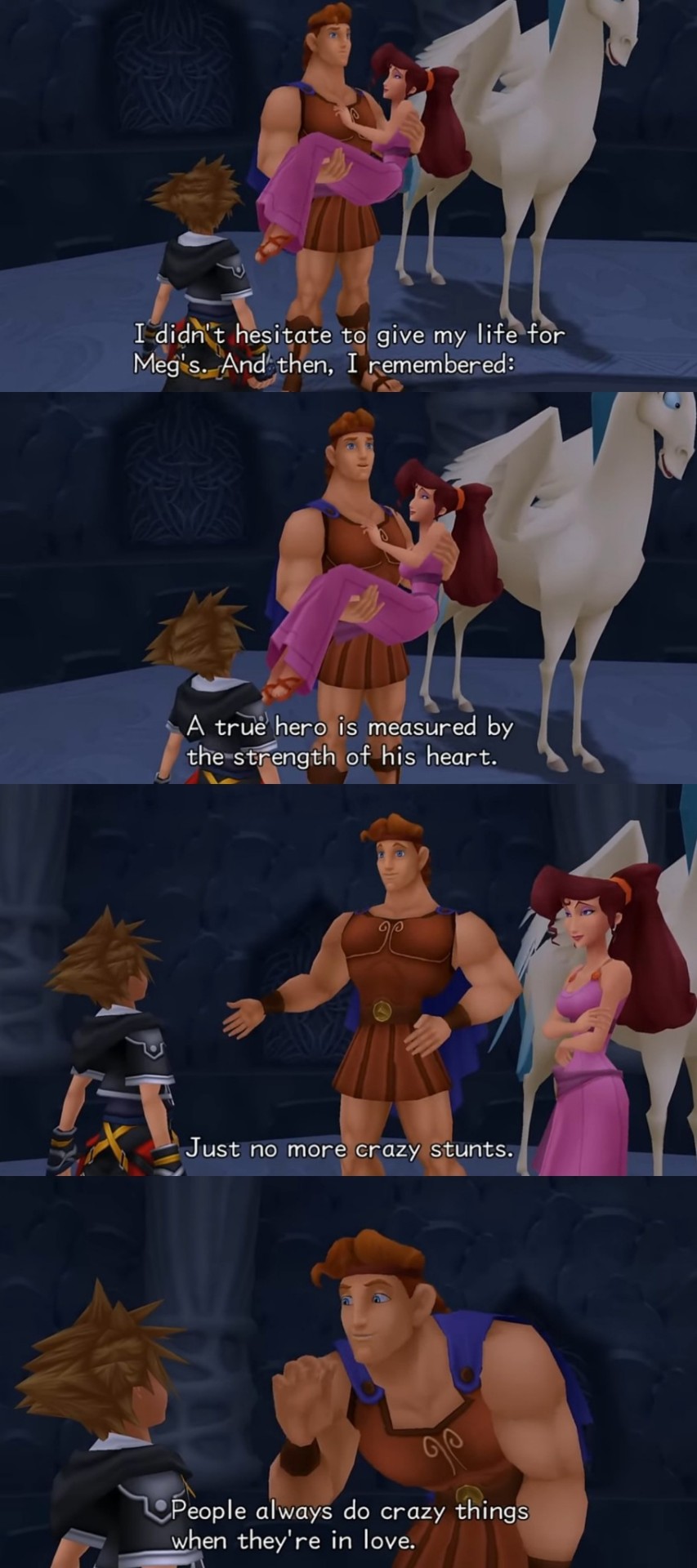
Sora scolds him and tells him not to do anymore crazy stunts after this reckless dive to save Meg (screenshot makes it look like herc is saying it sorry lol) and that is where we can see the term "mucha" being used in Japanese:
instead of crazy stunts, Sora moreso says "but don't be reckless (mucha)":
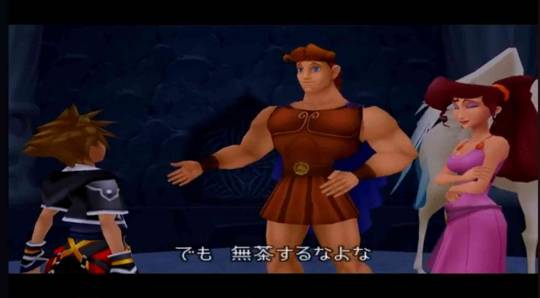
to which herc responds:
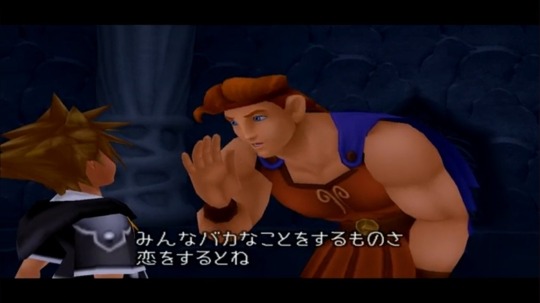
"people always do stupid things when they're in love" (note he doesn't repeat reckless, he says "baka" lol)
so here we have a direct link between herc's sacrifice when he dove in to save Meg, the restoration of his power/Godhood, and acting recklessly (mucha), without Fear or Doubt, to save someone he is In Love With. put a pin in this because it's all connected.
Now moving onto KH2.9 and KH3. From the start of the game we are told Sora has lost the Power of Waking, and his Entire goal in the game is to regain it, wake Ventus, and prepare for the battle in the KBG with Xehanort.
The Power of Waking is already a very vague, disney-esque power, essentially the power to free sleeping hearts from slumber (and first introduced to us in DDD, particularly in terms of Riku waking Sora up in a sleeping beauty retelling but I'm getting ahead of myself)
Yen Sid suggests that Sora go to Olympus for clues to regain his power, as Just Like Sora, Hercules also lost his power, but was able to regain it.
It's pretty straightforward, but in the interest of not making this post a fucking novel ill try to keep it short. Herc tells Sora he's not sure just *how* he got his powers back, just that he wanted to save Meg with all his heart when he (recklessly) dove in to save her. The game is trying to tell Sora that it's the Power of Love that brought back Herc's strength, and that Love will be key in bringing Sora's PoW back, too.
Specifically, I think that Herc's story and the other worlds Sora visits are saying that it's True Love that will bring Sora's powers back. Acts of true love in KH3 are framed as courageous, selfless, and performed unconditionally.
Despite the visit to see Hercules, Sora still doesn't gain the PoW. He has an idea of what he needs to regain it, but he has to visit multiple Disney worlds to learn more about the power of true love and sacrifice (well also separation but thats not as important to this post) before he's ready to test it out for himself.
After Arendelle (i think) we get to another important cutscene where Riku, Sora, donald, goofy, & mickey meet up with Yen Sid to discuss the progress they've made on their respective journeys. Sora wants to go to the Realm of Darkness with Riku & Mickey because he's worried, but they Won't let him because he doesn't have the PoW. Riku does the fondest laugh known to man, eliciting a bit of anger from Sora, but explains it's because of what Yen Sid had told him earlier - that had Sora or Riku known about Aqua being trapped in the RoD, they would have recklessly gone in to save her.
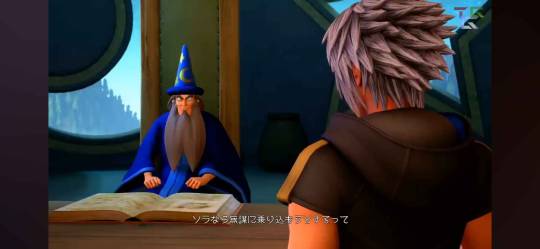
he's pretty much directly quoting yen sid here, just like he does in English (saying half-baked instead of reckless too). So basically saying here Sora would have marched into (the dark world) recklessly (had he known where Aqua was) - again using "mubou" like master yen sid.
Interestingly, when we get to Sora telling Riku to not be reckless in the dark world to Riku, he's not repeating the same word for Reckless that Riku is using (Now this might be just a flow of the conversation thing, which i certainly cant confirm as a non-native speaker but i think it's still notable)
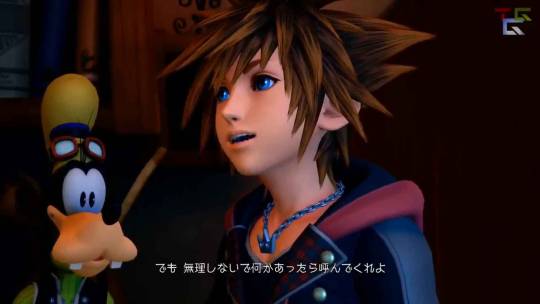
Sora says something similar to what is said in English; with a few distinctions. A rough translation would be "but don't overdo it, call me if anything happens" (need I gripe one more time that english localization cuts out sora telling Riku to call him; which is why he spends the rest of the time apart from Riku wanting a call, and why its so unhinged that Riku triangles for sora and basically summons him. I DIGRESS)
This line is translated as "but be safe, no reckless stunts" in English, which serves as a callback to what Sora tells to Hercules in KH2, (further solidifying a herc/riku parallel) but IMPORTANTLY, Sora is NOT even saying the same thing he said to Hercules in the Japanese script. He's saying something else - 無理しないで (muri shinai de), which is usually translated as don't overdo it - but literally means "don't do the impossible". This will be important later when I talk more about Riku so keep this in mind.
We immediately get Donald saying "Sora's the reckless (muri) one" (abbreviating for simplicity) but Jiminy disagrees. In English he says "He's not reckless, he just doesn't think!" but in Japanese he says this:
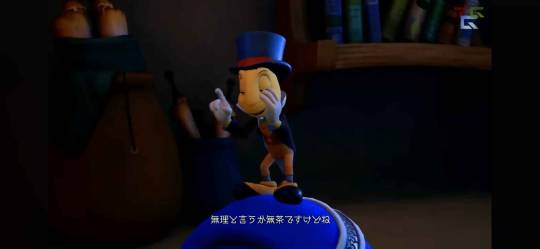
Which i know im going to butcher any translation I do, but Jiminy is basically saying "[Sora's] not muri he's mucha". That distinction is important enough for Jiminy to make a joke about it. That Riku might actually be the one who is overdoing it/trying to do the impossible (muri), while Sora is the one who runs headfirst into danger recklessly (mucha). Which, i think, is quite fitting, given the actions theyve done through the series.
Importantly we get one more instance of "mucha" which I think really ties Sora's trait "recklessness" together nicely, and puts into perspective what the repetition of these phrases is doing from a story telling perspective.
After Sora finishes up the remaining Disney world visits, S, D, & G find out that Chip & Dale have lost contact with Riku & Mickey. Sora is very upset at this, and is Determined to save them (Riku) (with all his heart). Sora has NOT GAINED THE POW at this point, and they don't know how to even get into the RoD, so Sora opts to "let his heart be his guiding key" to find his way to Riku and the RoD. (Recklessly I might add, he hasn't called or talked to Yen Sid or consulted anyone about it lol)
He arrives at Destiny Islands and mysteriously finds Master's Defender which happens to be the key to getting him into the RoD. Right? Well. We know from the glossary that the established method of reaching the RoD is with a keyblade of darkness, through dark corridors, or with the Power of Waking.
Others have argued this (see SRT) but it's heavily implied that Sora regained the PoW on his way to rescue Riku. That he used it explicitly to get into the RoD is where people tend to be a little caught up in the details, because it *does* seem like Master's Defender plays a role, which begs the questions - is it a keyblade of darkness? What the fuck was it doing there? etc. (literally saw on a kh wiki that sora got into the RoD because Masters defender was a keyblade of darkness, which is unconfirmed currently lol) It's also not traditionally what the PoW looks like. There's a huge door that appears, Sora isn't using the kingdom key, he doesn't burst out of Riku's chest. Etc.
HOWEVER. I think with the context of the narrative arc Sora is going through, the foreshadowing present in the game, and The Reckless Rescue angle can at least prove that he DID regain his power here, regardless of whether or not he explicitly used it to get into the RoD. I'll try to briefly summarize the points I've seen made before I add my own.
After the visit to Olympus, Sora explains to Yen sid that he didn't regain his power but he still learned a lot. Yen sid stresses again that sora needs the PoW, Sora gets pouty, and Goofy cheers him up by saying "maybe something will trigger it real soon". Shortly after a bit of banter, there is a knock at the door, and Riku and Mickey walk in. The camera kmakes a point to show Mickey off to the side, then pan up to Riku as he walks in to close the door, who is centered in the view (almost as if we are watching from Sora's POV, who is anticipating Riku's appearance in the door).
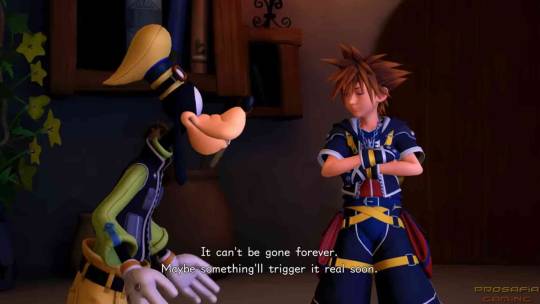
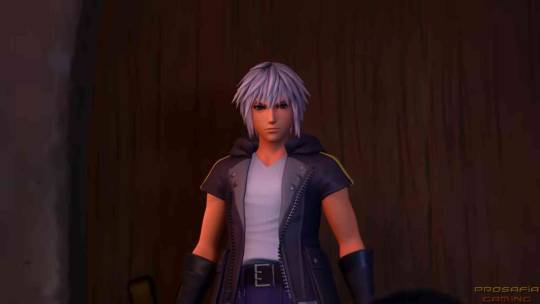
Putting this side by side is a little unfair, since it's not an immediate jump from Goofy saying this to Riku's entrance, but it's pretty in your face about just what (or who) might be key to reawakening sora's PoW.
We also get some heavy handed foreshadowing in the next visit to Yen Sid's tower, right before Sora tells Riku to not overdo it:
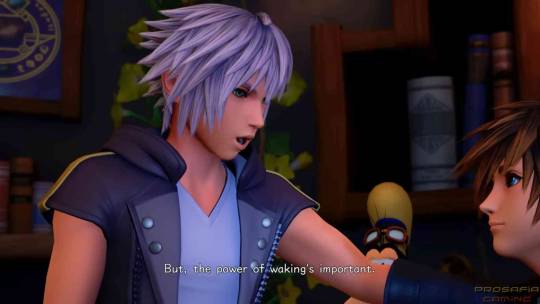
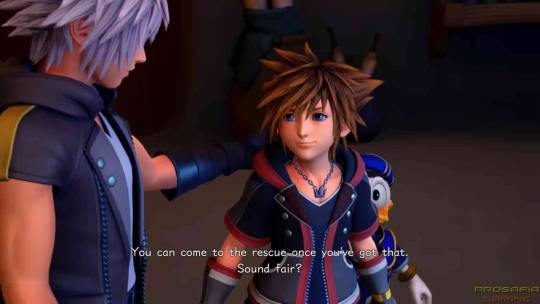
Yeah. and he does, importantly, get the power of waking, not BEFORE he comes to the rescue, but BECAUSE he comes to the rescue.
Now for my contribution since I stole the last two/three points from other posts. Just before Sora enters the RoD, he tells D & G to stay behind and that he has to go alone. (Sigh, yes, this scene is a parallel to Riku using the PoW to save Sora in DDD - it *has* to be him, and him alone) D& G protest, but eventually relent. But Donald doesn't let Sora go without saying this:
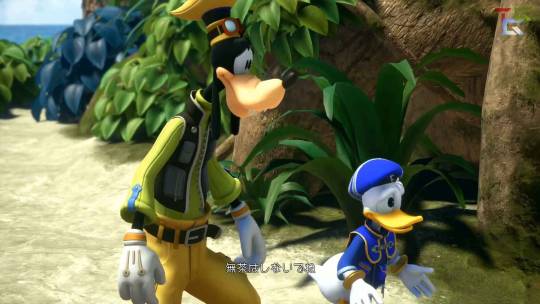
(In English, Donald says "you promise to be good?" inexplicably) but in Japanese he tells sora (basically) "Don't be reckless" - aka. No Reckless Stunts, complete with the use of "mucha" (recall Donald in the previous scene was the one to call Sora "muri" before being corrected by Jiminy). This is similar to what Sora tells to herc, so we are pretty much full circle on this scene being a callback to Herc rescuing Meg in KH2.
Like Herc, Sora does the reckless thing. Like Herc, he heroically dives into the abyss to rescue his loved one with all his heart.
Like Herc, Sora regains his power the moment he resolves to rescue Riku, even if it is not made explicitly clear to Sora OR the audience (perhaps the fact that he regained the PoW is why he is able to save aqua, too)
I could probably go on about this and what it means for Sora for a long time, but I think it's high time I actually wrote about "muri" and Riku's recklessness, so let's rewind a little.
I've already brought up how Riku relates to Herc in terms of his recklessness and heroics, but theres a few more things to add. of course. I'll recap with pictures of one of the parallels i've already discussed:
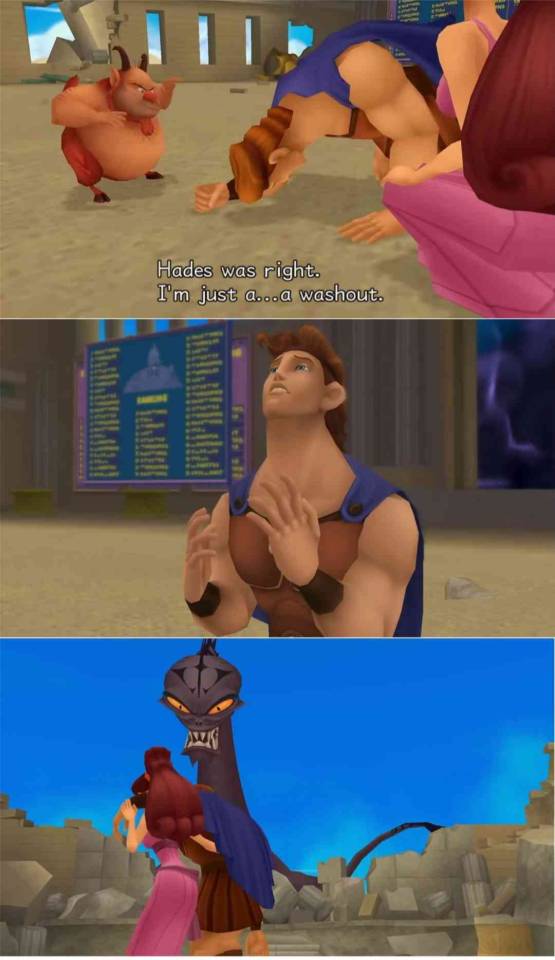

So here i think at least metaphorically, we can argue that Riku has lost a bit of his "power"- or rather, his drive. After everything is over, he just collapses, ready to die or be left behind. Sora WONT let that happen. So Riku asks Sora to lead. He confesses to some of the jealousy and superiority he'd been feeling over Sora for the past few years, and seems to be trying to find a new direction in his life, having now repented Quite a bit for the sins he committed in KH1.
Riku's entire purpose for fighting after KH CoM and KH2 was to wake Sora up, keep him safe while he does his keyblade weilder duties, reunite him with Kairi, and send him on his merry way. Sora refuses to let him leave, and demands that he comes home with him. So he does. but without his jealousy over his feelings toward Sora, or without his feelings of guilt and feeling he needs to make it up to Sora, what is left to drive him to keep fighting?
DDD gives him a pretty strong answer - it's where he both rediscovers his sense of purpose and gains the Power of Waking in the process. And his dream eater powers too. btw
Riku's journey in DDD is, simply put, not really about passing the mark of mastery exam and becoming a keyblade master. it's about remembering What he lives for. remembering his promise to Terra, and how those feelings have evolved - from wanting strength to protect the Stuff that matters as a child, to, in DDD, discovering that the "stuff that matters, like his friends" was Sora the Whole time, and that Sora is actually a "precious best friend" that he wants to protect. It's About recovering his strength, like Herc needs to do in KH2.
So how does Riku regain his "strength"? By Sora-style taking a reckless dive into the deep abyss of Sora's heart to wake him using the PoW.
(Not once was I able to find any mention of "recklessness" here, or any particular language that ties this moment together cleanly with what happens in Olympus Colliseum in KH2, but the repetition of diving down into an abyss to rescue someone (with all your heart. etc) is Enough of a parallel to make the connection between this scene and Herc's dive to save Meg)
It is within the deepest depth of Sora's heart where Riku is interrogated by three pieces of Sora's heart about what he's afraid of, what he cares about more than anything else, and what he wishes - All canon answers involve the mention of "precious" - "taisetsu" (sorry im not explaining this one im going to just assume you know what im talking about if you are a soriku that reads meta you should know.) - to lose something precious, my precious best friend (fuck da english localization for this one), to recover something precious that I lost. It is here that we see Riku's simple "protecting important stuff" become "protecting something precious/my precious best friend" (note that this hasn't quite become "taisetsu na hito"/precious person but hes getting there)
Ansem the wise is there i guess and he tells Riku that his 3 answers are what were the key to waking sora up, and I think, importantly, are what give Riku his "strength" back. He has rediscovered his purpose, which is, to him, protecting Sora (with all his heart)
Continuing into KH2.9 we have another couple scenes that will both complete Riku's development from protecting stuff that matters to protecting a precious person and also continue to make a strong connection between him and Hercules.
It's been pretty well established that these two scenes are deceptively mistranslated, but i'll go over it again
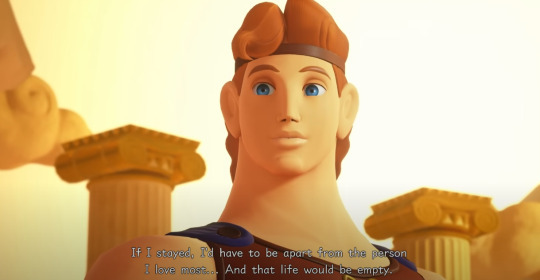
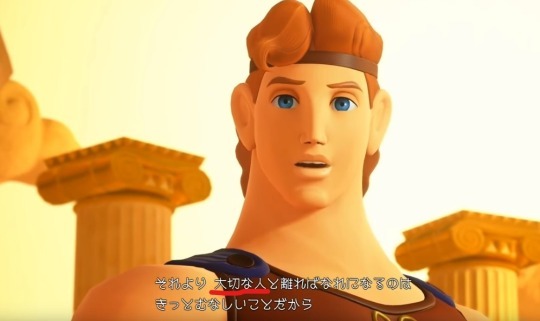
Herc here is saying "taisetsu na hito" which is translated to "person I love most"
The EXACT phrase Mickey uses to tell Riku why he's feeling more powerful and fearless in the RoD, in the literal next scene in 2.9. They were supposed to be VERY CLEAR hit you over the head parallels but, well. SENA said fuck gay people i guess.
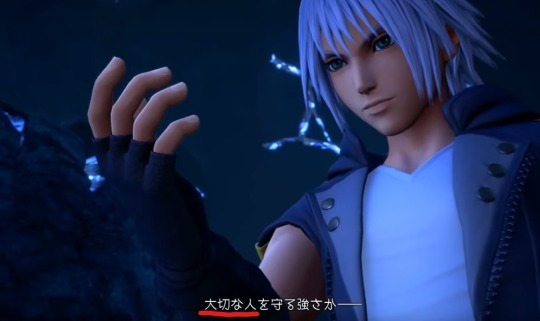
Riku repeats what Mickey says into his hand ("strength to protect my precious person") and recalls his promise to Terra, to protect the things that matter. (again it's implied it's always been about protecting sora, he just didn't have the language or understanding of himself yet to know how to say it)
There is absolutely no room for nuance here. This is explicitly framing Riku's feelings for Sora on par with Herc's feelings for Meg eg. explicitly romantic. And that it's his ROMANTIC LOVE for Sora that is what gives him his strength - not just to protect Sora, but also to do THE IMPOSSIBLE
phase ??? of my argument will now commence hang on to your butts. (i wrote this all in one night im tired)
Now that ive Exhaustively set that up. lets actually get back into discussing what I initially set up - riku doing the impossible "muri" thing.
As a reminder, Sora tells Riku to not "attempt the impossible/overdo it" in the RoD. And to call him if he needs him.
So Riku, instead of attempting the impossible in the RoD by facing the demon tide, does call Sora, which ends up being what saves the day! Yay!
I have bad news though! Riku is terrible at listening to advice when Sora is in trouble.
Now recall what I mentioned earlier about the fall of the guardians in the KBG and Sora's subsequent breakdown being a parallel to Herc losing his power in KH2. Sora *fails* everyone here, and he explicitly states he is worthless, without strength, when he loses them. It's very in line with Herc losing his powers in KH2.
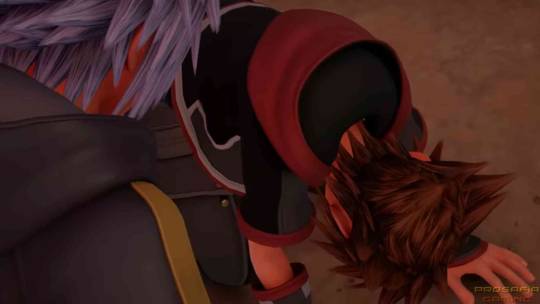
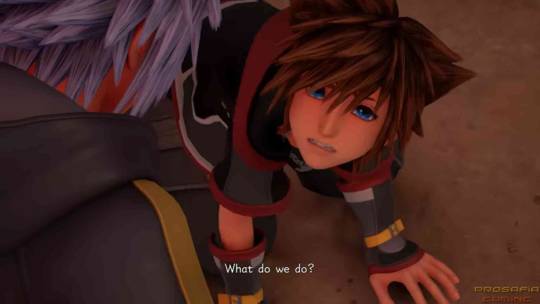
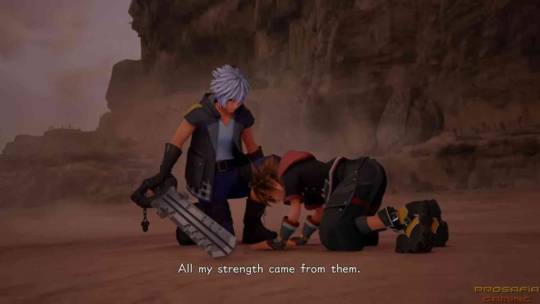
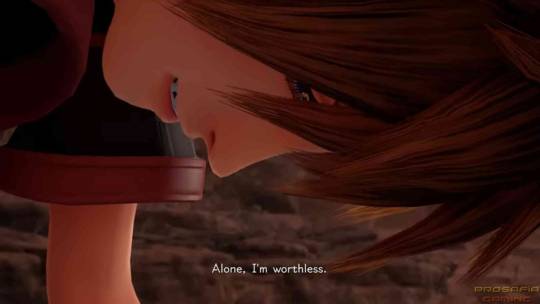
(just putting these in here to hurt you and myself)
So, we get the Herc parallel, but it stops here for Sora. He doesn't do some grand self sacrifice for Riku to prove his heroism and regain his "power", but i think theres a reason for that beyond it just being Riku's time for the spotlight but I am getting there.
In the english localization, Sora says "we've lost, it's over". It's a subtle change from the Japanese, where instead of "it's over", Sora simply utters "muri da--" ("its impossible") (in the wettest saddest voice you can imagine)
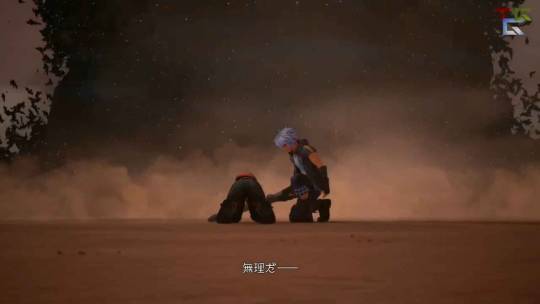
It's at this moment where I do truly think we're meant to make the connection between Sora saying "its impossible" and Sora telling Riku to not attempt the impossible. It fits in nicely with Sora telling Herc to not do reckless stunts, with the slight change in language from "reckless" to "impossible", and with the impending self sacrifice. Riku knows that beating back the demon tide is impossible. But he does it anyway (compare to how, when faced with a much smaller demon tide, and he was losing, he listened to Sora's advice and called Sora for help instead of attempting the impossible)
So we have Riku's ultimate true love sacrifice for Sora, which both takes his life and grants him a spot upon an alter in Olympus, perhaps symbolically giving him some sort of ascension for his heroic deed. And again tying his sacrifice intimately to Herc's.
Because Sora and Riku are both "herc" and "meg" here I am going to make a little bit of a reach. Recall that I went through the effort of recapping the climax of the hercules movie. for no reason. There is a connection though even if it's loose, and i would kick myself for not including it.
In the movie, Meg, like Riku, protects a powerless Hercules from impending danger in her own act of true loves sacrifice. Her death gives Hercules his strength back (partly due to contract BS but it's still a romantic moment). And her death is what drives Hercules to dive into the Soul Hole to rescue her soul at a potentially great cost, which is what ultimately restores his godhood (showing his strength of heart). Riku sacrificing himself for Sora can be seen to be more like the events of the Hercules movie, Riku standing in for Meg - Sora does have to restore Riku's heart after it's been taken by the Lich, after all, much like Hercules brings Meg's soul out from the Hole. And Riku's sacrifice is what gives Sora the resolve to keep fighting. (not arguing with anyone who thinks it was only kairi because it wasnt lol)
So Riku attempts the impossible here, and ultimately he is rewarded. An interesting nuance is that the phrase "attempting the impossible" isn't meant to be taken as a challenge. From what ive read from native speakers, the phrase Sora uses really is better translated as "don't overdo it" as it is less about proving yourself to be able to overcome crazy obstacles and more about keeping your expectations in check. But Riku is reckless, and following his heart, which he learned from Sora.
I hope I've properly illustrated how Sora and Riku are both painted as reckless in different ways, and how the language used in KH3 is making direct references to Herc's reckless heroics in KH2 and in the actual Disney movie. And how these reckless acts are showcasing how much these two love each other, because I still have one more point to make. Namely, how this ties into Cinderella, and ultimately KH4.
In Terra's route of Birth By Sleep, he happens upon a distraught Cinderella, who has had her dress torn up by her step sisters. She was planning to go to the ball, but cannot, because it is "impossible" (muri)
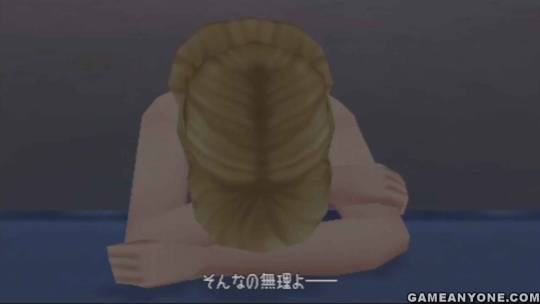
Terra tries to console her. It's all very reminiscent of the scenes of Herc's, Sora's, and Riku's defeats.
After Terra fights off the unversed summoned by Cinderella's negativity (toxic much..), Out of the blue, the fairy godmother appears and makes everything better. She fixes up Cinderella with a dress and a ride to the ball, and sends her on her merry way.
She explains to Terra that she appeared to Cinderella to show her that her dreams *can* come true and that she typically appears only to people that have a strong belief in their dreams. Terra says he believes in dreams but you have to work for them, to which FGM responds that simply believing in dreams is already a difficult thing on its own. (Ventus also compares Terra to Cinderella. btw. because of his strong dreams)
Now. Sigh. Im not the only person that has pointed this out. The FGM quite literally appears to Riku, but only after a year has passed and they have no leads on Sora, and after it's implied that Riku is starting to lose hope.
In the limit cut, you can see Riku's sad wet puppy dog face as he talks about how hard everyone is working, and how they haven't found anything at all. He says "if Sora is really out there, don't you think we would have found something by now?" - Again, he's losing faith in his dreams of Sora's return. This is important.
I do not have the strength to go through and find all the times Riku told everyone to believe in Sora in KH3. It's a lot. And the last thing we hear him say Near Sora, is to let him go on his suicide mission to save Kairi - to BELIEVE in Sora (#wish).
So one, we know the dream Riku believes in is Sora, and two, we know he is starting to lose his belief in his dreams, like Cinderella before the ball, when he dress is destroyed.
Right after it's clear their is no lead through the data from Org 13, FGM appears, just like she did for Cinderella. And she tells Riku that His Dreams Are Literally A Key To Find Sora (that hes quite literally been #dream drop distancing into sora's dreams while hes in unreality is already so much without the FGM being there to explain this to him but KH is crazy!)
One last thing to really drive this home. The FGM brings Riku and Kairi to the nameless star to bring the three keys together.
And what does she tell Riku, before he leaves?
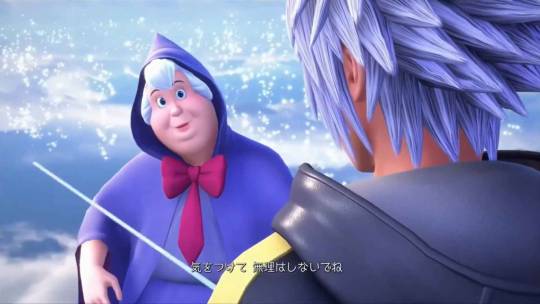
"Be careful. Do not attempt to do the impossible."
---------
if you read this whole thing... well... im proud of you. I know i definitely missed stuff, because it would be so hard to go through all the games and really dig for the use of this term especially when I dont speak japanese at all. and because i wrote this all in one night. But dont hesitate to comment or reblog if you have anything to add. I freaking love kingdom hearts
#soriku#kh meta#kingdom hearts meta#long post#it was not going to be this long 🥰#i might make an abbreviated versuon#i could not be assed to read this for errors so sorry if i make mistakes i wrote this in chunks thru the night#barely scratched the surface on how this all ties in with believing and shit#i thoguht about including the hollow bastion kh1 riku and sora reunion and the beast resolving to keep going#for belle#and how he ended up there by believing#against the impossible odds#but theres already so much here#I will probably come back and edit this post later but i just want to post it now
173 notes
·
View notes
Text
My one major issue within Astarion's romance storyline (spoilers)
TLDR: player shouldn't have to sleep with him in act one to initiate the romance.
(also please correct me if I'm wrong about this being the way the romance triggers. All the information I found said that the act 1 intimacy scene is necessary)
First of all, this just locks you out of romancing him unless you’re a very particular kind of person. On my playthrough, my character is not at all the type to sleep with him casually, but I went through with it because I very badly wanted to see his romance storyline.
So let’s examine what leads up to the scene. Astarion, upon meeting the player, recognizes power in them and thus someone who can help protect him. He comes up with his “nice, simple plan” to seduce the player in order to get them to trust and care for him. This makes complete sense for his character, as he sees his main and perhaps only source of value being what he can offer physically. It’s what he knows how to do, and so in this crisis situation, of course it’s what he defaults to. The fact that he propositions the player is not what I have a problem with. It’s the fact that they have to say yes in order to further the romance, or else they’re locked out of it.
On a practical level, I can understand what the thought process behind this might have been. Having a character proposition the player, being turned down, and then coming onto them again in the future might make them come off as a pest, which can make a character majorly unlikable. However I would argue this can be worked around because it is made very clear that the first encounter with him is meant to be a purely casual intimacy. Having a confession scene later where he proposes something more sincere would feel completely different, offering something new rather than not taking no for an answer.
But the game forces you to accept his offer if you want to further the romance. This leaves the player in an uncomfortable position no matter what. There are two intimacy scenes possible in act one, the first being his high approval scene that can trigger whenever, where he makes the offer and the player can choose. Skipping this one does not lock you out of the romance IF you do sleep with him at the Teifling party afterward (if I’m not mistaken). The Tiefling party version of the scene is much much better if you care about him as a person, in my opinion, because he keeps the fact that he sees it as a transaction to himself. In the high approval scene, he outright says, albeit flirtatiously, that this is a reward for letting him drink your blood. Him presenting the encounter that way feels very icky if you say yes. So while it’s very in-character and a very honest and raw portrayal of how his trauma has affected him, it leaves the player in a bad position.
Now, this plot point is crucial to his overall story, yes. He needs to initiate this kind of pandering to the player character, trying to seduce them and get their trust and loyalty. My argument is that this can be done *without* the sex scene. If I were to rewrite this scene, I would have it that he invites the character to the woods after the party in a more ambiguous way unless you yourself bring up the topic of sex. Then, when you’re both there having your private conversation, you can choose to decline his advances. He could become puzzled and maybe a little annoyed and say something like “why did you come here, then?”. The player could then have the option to respond with “I wanted to get to know you better” or something. This could be a really sweet and heartbreaking moment to look back on after you learn more about him. Give him a genuine moment of confusion in this scene, because it challenges what he thought about himself and other people; someone doesn't want him just for his body, and they also want to get to know him as a person. This would probably be a confusing and difficult feeling for him. He’d mask it quickly, of course, but still. Then, there could be a nice moment between them where they just have a cute conversation about anything. Maybe they could even just make this scene into a slightly different version of his scars scene the morning after. He showed up shirtless after all, so the player could go on to ask him about that and it could be a wholesome bonding moment. This would allow the player to show interest in him without it being explicitly sexual, but also not locking you out of the romance route with him. Also it’s asexual friendly. On a narrative and emotional level, this serves basically the exact same purpose as the sex scene(s), with the exception of the regret and moral greyness, which I think the player should be able to avoid anyway if they choose. Especially upon replays, this forces the player to engage in something they know is not an enjoyable experience for him, in order to trigger his romance storyline, which I think is kind of wrong.
Interesting point here, though: If you’re playing as origin Karlach, then you can't sleep with him at first without, you know, burning him to a crisp. The romance plays out the same otherwise, PROVING MY POINT that it’s not necessary. In this version of events, they just “talk and fall asleep”. This would be exactly what I wanted. I just really wish this were an option in any other case.
I'm too demisexual for this.
80 notes
·
View notes
Text
just rewatched all of hlvrai (in one sitting. i’m doing fine mentally btw) and it made me think about the fine line between comedy and horror. because those videos constantly dance back and forth across that line, which is funny in itself, but also there’s some scary-ass implications in that series. most of them involving Dr. Coomer, of course. because the fact that he’s a normal NPC with flashes of sentience and tiny moments of scary behavior that he immediately moves on from is a joke. it’s funny. but then there are the parts where it isn’t.
like, as an example. there’s that one moment near the end when Gordon goes back in time and talks to a past version of Coomer. he’s frantically begging Coomer to help him get back to the boss fight he just came from while Coomer’s still just trying to give the usual NPC spiel that the scientists give at the beginning of the game. but then Gordon says that Coomer can take all his PlayCoins™️ if he just helps him get back to the other dimension. and Coomer (who i just realized was probably not self-aware yet at that point, and maybe even woke up because of this conversation) is confused at first, and then pauses and whispers “Why do i know what those are…?”
and maybe it was just Holly’s delivery that made that moment in particular stick out in my head (i’ve really gotta give her credit, she’s a fantastic performer and her incredible improv is the whole reason this character is so great) but it’s just such a haunting moment. it’s far from the first or most blatant example of Dr. Coomer being confused by his own knowledge of the mechanics of the game he’s in, but the subtle horror in his voice contrasting with his chipper demeanor right before that really gets me. i also think part of it is because it happens in a quiet, mostly serious scene for once, and they actually linger for a second on the concept of Coomer realizing his world is fake
to tie it back into the “line between comedy and horror” thing, i feel like that sums up the difference between the two. a lot of people say horror is comedy with no punchline, and i think that’s mostly true, but it’s also a little more specific than that. i think comedic works will sometimes make it part of the joke that a situation is creepy, but they’re not dwelling on it. the fact that something’s freaky but everyone’s brushing it off is funny. but that same work can become straight-up horror when you make the audience sit with those implications. when you say “no, we’re not moving on from this. we’re examining this. we’re looking straight at this. you don’t get to look away.”
307 notes
·
View notes
Text
Reverse SAGAU: The Weird Door At My Café
Chapter 1 | Chapter 2 | Chapter 3 (here) | Chapter 4 | Chapter 5 | ...
Masterlist
Blog Navigation

Tw: Reverse!Isekai!Sagau, Normal Au, Café Au, a bit of cussing like this bit 🤏.
Reader: Gn!Reader, Adult!Reader, Café Owner!Reader
Characters: Reader, Paimon, Traveler
Note: Restaurant to Another World animanga inspired au. There is a taglist if you want to be tagged. Also, I may say that the characters other than the reader may be a bit OOC cause it's been a long time since I played genshin and I'm just finishing all of my works with my knowledge left from playing the game. So sorry about it 🙏🙏.
ALSO, sorry for the inconsistent updates. I'm busy with uni and my job so, I have very little time to write.
____________________________________
'Oh no no no. It's the Traveler and Paimon. Shit! What do I do? What do I do?' You're heart is beating so fast that it might just pop out of your chest anytime. It felt like eternity, just looking at both of them, it's as is if time is slowing down. 'Should I just fake dead? No, that will make them worried then come up to me and then- OH NO!' You eyes widen in horror as the two come near you with worry etched in their faces.
"Uhm. Hello? Are you okay?" Paimon with her high pitched voice asked you. "Are you hurt somewhere?" The Traveler extended a hand, offering to help you up from the floor where you were sprawled upon.
[Reader.exe has stopped working. Brain circuit has malfunctioned. Attempting to restart... Failed. Reloading...]
You looked at them absentmindedly, your brain struggling to process the situation. "Huh?" The Traveler, noticing your distress, gently carried you and placed you back in your chair. They wiped the tears from your face with a handkerchief, their touch warm and comforting.
"Hmm. Traveler. don't you think that this place kind of resembles a restaurant of some sort? Or like Puspa Café? But just more... uh advanced???" Paimon flew around the Café, examining each and every corner. "And it smells so lovely in here." She kicked her feet in the air while giggling as she looked at the pastry you had on your plate hungrily.
The Traveler nodded but their attention was still on you who looked like as if their soul was going to heaven. 'As expected, they do seem familiar and their aura... Where have I felt this?'
As you sat in your chair, dazed and just all in all trying to process what is going on, the Traveler placed their hand in your shoulder. the warmth in their hand seemed to have had woken you up in your stupor. "Take a deep breathe. You seem quite overwhelmed by the situation." Gently their voice was. They noticed your drink in the table and slowly pushed it towards you. "Drink first, water would have been better but I can't seem to find any."
"Sorry for startling you. We didn't mean any harm." The Traveller smiled as friendly as they could. "I'm Traveller and she is my companion, Paimon. May I know your name?"
"Uhm... My name is... (Reader)..." you introduced yourself, voice still shaky. "(Reader)... That's a lovely name!" Paimon chipped.
"Oh, yes. I almost forgot. Can we know where this place might be? This place is quite different from what we are used to and as you have seen earlier, we came from that door. The door appeared during one of our commisions and our curiosity led us here. It will be quite helpful to know where we are as of now." The Traveler slowly told you, thinking that you still might be startled at the moment.
"Ah. This is a Café and I'm the owner..." you explained, trying to regain your composure.
"I see." The Traveller nodded and seemed to be in a deep train of thought at your answer.
"WAHH! Traveller! Look! Look!" Paimon squealed. She flew to the Traveller and urged them to come with her. "Wait! Paimon! Slow down will you-" Silence. An eerie silence washed over your building. It was getting awkward so you had decided to walk over to them and try to explain the very advanced planet you live in.
As you approached the duo, you coughed, albeit awkwardly, and cleared your throat. "Uhm yeahh... As you can see outside of the window, this world is not the same as your world. It's quite baffling, right? I was also the same when I saw your world on the other side of the door." You scratched your cheek.
"What is this place?" Paimon said in awe, continuing to look at the scenery outside. The Traveler just continued looking outside speechlessly, eyes darting to one thing ot another. Then suddenly your eyes widened at a realization but you still kept yourself calm.
You explained to them softly, "The planet where you are in is called Earth and we are currently in (country name) situated in (where your country is)." While they where admiring the scenery, you took a quick silent run towards the shelf where the standees of genshin impact where situated at and roughly shoved them inside an unused cabinet.
"Oh yeah, what's your planet called?" You feigned ignorance of knowing who they already are. After all, if you somehow learned that you were just a game character, what would you feel? Wouldn't you feel so detached? or something along those lines and you don't want the both of them to go into a spiral of depression and continuous questions. It's also because you don't know what kind of excuse you will make if they ever saw the standees. It's only a miracle they didn't see it earlier.
"Oh uh, we're from somewhere called Teyvat. We're currently staying at Mondstadt due to some personal bussiness." The Traveler replied.
"I see. Teyvat... I have never heard of that. Come, sit here. Choose anything you guys want, except for the *cough* pastries cause they are only going to be delivered tomorrow. Also, my treat!" You winked at them as you gestured for them to seat at a table.
"You don't have to treat us to this. We will pay you for your service." The Traveler quickly told you. "Oh please, I insist. Besides, you guys are my first customers. Now, choose what drinks and snacks you would want in the menu." The Traveler wanted to refuse again but refusing twice would be quite impolite and you seem quite the person who would not go against what they say and stick to it no matter what so, they accepted their defeat with a soft sigh and begun browsing through the menu.
"WOAH! All of the drinks and foodsin the menu look and sound so amazingg! I can't choose!" Paimon squealed. Actually, you were quite suprised that Paimon has her very first voice and not the new one. Her squeals are more tolerable and she doesn't sound like a pig going to be butchered.
After minutes of them painstakingly choosing what they want and consulting you on what some of drinks are, they finally decided on what they want. Creamy Caramel Mocha for Paimon and Hazelnut Coffee for the Traveler.
(Note: I just randomly choose what I think they would want from the drinks I have already tasted so it might contrast with what you guys think they would like.)
You went behind the counter and proceeded to make their orders while you guys talk and ask each other about you guy's worlds, of course with you feigning ignorance even though you already know most of the lore.
_________________________________________
Without any of you three knowing, you lost track of time and soon it was evening. You had so much fun teaching them about Earth and listening to their tales of adventure on Teyvat. Paimon even provided you with an extensive list of her favorite foods from each nation, in case you ever decided to visit Teyvat. Nonetheless, you feel grateful but you don't know when you will go to their world but probably when you have a glock in hand would be the best time to go there. For now, you were content to cherish the memories you had made alongside them.
It was now time to say goodbye. You feel kind of sad since you have bonded with them much more in this short time but it's time to let go. Maybe there will be another next time or maybe not but, you are sure that you will wait again for the time they will come back again even if it's a long time. After all, they are still looking for their sibling so they may not have that much time to be able to visit you.
With a heavy heart, you packed some of the leftover pastries to give them as a farewell gift. "Wahhh! Thank you (Reader)!" Paimon exclaimed, tackling you in a grateful hug. "The next time we come here, we'll be sure to bring some delicious treats from Teyvat!"
The Traveler looked at you warmly. "Thank you (Name). I'll make sure to bring the finest sweets next time we meet." They stepped forward and embraced you gently. "Although our time together was brief, I cherished every moment."
"Me too..." you replied, your voice tinged with a hint of melancholy. Standing before the door, you gently waved them a farewell as they prepared to depart. The Traveler and Paimon returned your wave, their faces reflecting the same emotions you felt. With a deep breath, they turned and stepped through the threshold, embarking on their continued journey.
As you watched them depart, you couldn't help but feel a bittersweet longing. But you knew that their paths would cross again, and you would be waiting, ready to welcome them back with open arms and a fresh batch of pastries.
_________________________________________
Taglist:
@kameyo-kumo
@esthelily
@haru-tofuu
@udretlnea
@shining-nebula2000
@ifeellikejumpingoffacliff
@resident-cryptid
@allblognamesaretakenlikereally
@leilakaro
@stvrbrighttt
@chericia
@evaline-ethan
@ra404
@mmmhyperfixation
#genshin impact#sagau#genshin sagau#gn!reader#genshin series#•works[🍡]•#gender neutral reader#genshin impact sagau#genshin#genshin reverse sagau#genshin reverse isekai#cafe owner! reader au#genshin x reader#genshin x gender neutral reader
239 notes
·
View notes
Text
I was listening to Pride and Prejudice on my drive back from my mother's today and it's been so long since I've actually read the novel as opposed to engaged with one or other adaptation...
Goodness, it's good, isn't it? And Elizabeth is so much more complex a character than she is often presented in adaptations.
The thing that was standing out to me today - I was listening to from when Mr. Collins proposes to Charlotte and I stopped just when Elizabeth was talking to Colonel Fitzwilliam at Rosings - was the chapter which is just Jane and Elizabeth talking about Bingley. This gets cut from adaptations or so condensed to be meaningless, but it's incredible. It's just a whole chapter of the sisters chewing over why Bingley ghosted Jane (for lack of a better term) and what Caroline's motivations were and the thing that gets me is that they're both right. Jane is right that Bingley can't be blamed for being a friendly young man and that he had no malicious intentions but Elizabeth is also right that young men can be thoughtless in their dealings with women who have less freedom than them and their thoughtlessness can do real hurt. (She's also right about Caroline, of course.) It struck me as such a modern issue. Maybe I've just been thinking about the unwitting hurt that thoughtless young men can cause recently, but everything is so complicated. Bingley is a flake who makes a mistake with regards to Jane but he's also a genuinely lovely young man who makes it right in the end - he's still on his own journey through life which he will continue with Jane. Jane herself lets her desire to see the best in others cause her to see friendship where it isn't, but being deceived in a friend is not so uncommon, is it? And she's not stupid or weak. Heck, she endures her heartbreak being talked about openly by her mother in public for months silently and without rancour. And she does it all without ever resenting Bingley! Jane's the strongest character in the whole novel and an inspiration to the rest of us - FIGHT ME on this!
The other thing I really picked up on was what an important moment in Elizabeth's character development Charlotte's engagement is. It actually kind of breaks my heart - her best friend makes a life choice that she can't support but has to and nothing will ever be the same again between them. It's the first dent into Elizabeth's world view that forces her to see that people are different from her and can make different decisions and this is okay and not just something she can laugh at. It's so relatable in terms of life events - when a close friend marries and then when they have a baby, these things absolutely still do alter friendships. Elizabeth gets over it and even enjoys seeing Charlotte in Hunsford but we are frequently reminded by the narrator that the previous confidences they enjoyed will never be the same again. It's a really big moment for Elizabeth and really the first event in the novel to start to shake her foundations of her comfortable existence. The other two are Bingley's desertion of Jane and Wickham's decision to pursue Mary King over her. By the time she goes to Hunsford, she is prepared in a way for the final massive shock to the foundations of The World According to Lizzy Bennet, not that she knows it. Such is growing up.
And OMG Lady Catherine is SO vulgar and inappropriate! She is a direct parallel to Mrs. Bennet and the rest of the Bennets. Just as Elizabeth feels accute embarrassment at the Netherfield Ball, Mr. Darcy is feeling exactly the same at Rosings. Beautifully done. But their awareness of what is appropriate behaviour is something that unifies Darcy and Elizabeth even if Darcy massively fails to behave like a human around Elizabeth. Pride and Prejudice is such an expose and examination of "how to behave in social situations". There is nobody who doesn't come under scrutiny and pretty much every type of behaviour is gone over with a fine tooth comb.
Sometimes I feel almost ashamed when people ask me what my favourite novel is and I say "Pride and Prejudice" because it's such a damn cliche. I should say something heavier or more obscure or at least I should say it's Persuasion, the "thinking girl"'s favourite Austen. But P&P is so special to me on so many levels and you know what? It is a MASTERFULLY written book.
430 notes
·
View notes
Note
I'm writing a story where a childhood friend comes back into the protagonist's life after a few years and there are some lingering romantic feelings between them, but the protagonist is in a relationship, although it's a casual relationship that he feels more seriously about than the other person involved. Both relationships are developing through the story, but I'm having trouble showing the contrasts between the two relationships. What are things I could add to show how differently they both know the protagonist?
Illustrating Differences Between Two Relationships
If you haven't already, go ahead and flesh out what both of these relationships were like. What were the strengths of each relationship? What were the weaknesses? What was the most romantic moment? What was the least romantic moment? What was the average date night like? What was the average "time spent together" session like? What three memories would the protagonist highlight as their favorites of the relationship? What three memories would they highlight as their least favorite?
Once you've fleshed out what the relationships were like, you can use the following methods to illustrate them for the reader. You can provide contrast by illustrating them in close proximity. For example, maybe the current love interest does something romantic, which makes the character think of the most romantic thing the previous love interest did.
Ways to illustrate the relationships for the reader:
-- have the protagonist recall past relationship memories either via the narrative or via dialogue; find a way to relate this recollection with something parallel in the current relationship
-- use a current relationship moment/situation to lead into a flashback where the protagonist relives a similar/better/worse moment in the past relationship
-- use internal monologue to have the protagonist mentally process differences in the relationship
-- use dialogue with another character to have the protagonist discuss differences in the relationships. You can also have the other character make observations about differences in the relationships.
-- have the protagonist notice differences triggered by things like photographs, old e-mails or letters, mementos or gifts, etc.
Some other things to keep in mind:
-- illustrate differences in how the love interests reacted to similar situations/moments/events
-- illustrate differences in protagonist's emotional state during similar interactions with each love interest
-- highlight commonalities and differences between the protagonist and the love interests
-- illustrate differences in emotional and physical chemistry
Hopefully this will get you on your way to illustrating and examining key differences between your protagonist and their current/previous love interests. Happy writing!
•••••••••••••••••••••••••••••••••
I’ve been writing seriously for over 30 years and love to share what I’ve learned. Have a writing question? My inbox is always open!
♦ Questions that violate my ask policies will be deleted! ♦ Please see my master list of top posts before asking ♦ Learn more about WQA here
119 notes
·
View notes
Text
Tragedy of the Jade Nightingale. Or: My thoughts on Vol. 11 of the Apothecary Diaries.
Given that this volume just came out in English a few days ago, spoilers under the cut!
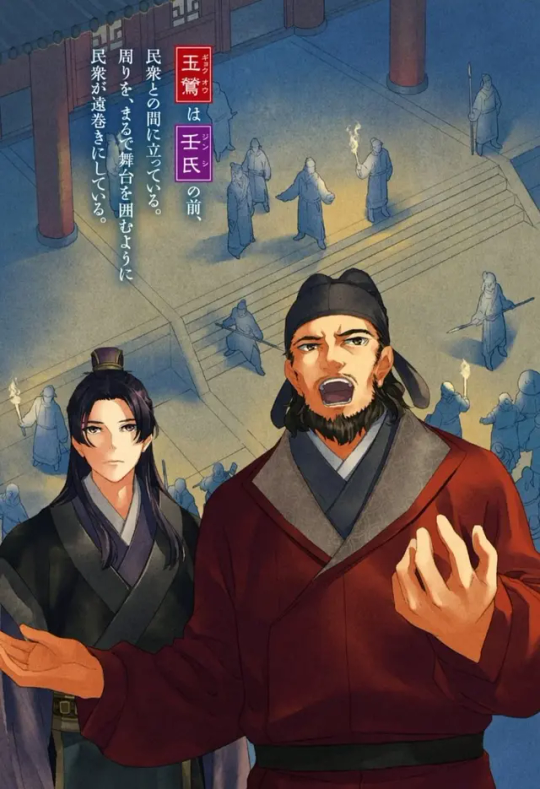
I usually think of the Apothecary Diaries volumes as pairs - usually two volumes make up an arc. If so, Volume 11 will be the first half of the arc with 12, but it also functions beautifully as a tragedy in it's own right.
** I will be only discussing information appearing officially through Vol. 11. Yes, I have read the fan translations of the web novels, but given that details can change, until it appears in official English translation, I won't yet be including it here.
The Hero
Gyoku-ou. Talk about someone who thinks he's smarter than he actually is. We knew this guy was a threat all the way back in Vol. 8, with how Gyokuyou reacted to her brother's letter and his veiled insult of sending a younger version of herself to catch either her husband's attention or the Imperial Brother's. Now we get to see him in action and he's scary - right up until he's not.
This man is charismatic as anything - he understands what makes people tick on both an individual level as well as a social level. His ability to wield a mob effectively makes him extremely dangerous, but I'm oddly put in mind of Lakan's initial impression of Fengxian. "This woman is strong, but she only knows how to fight in her own, small world."
The world Gyoku-ou inhabits is a very small, petty one. You can see it in his conspiracy theory about Jinshi's birth.
Jinshi is one of two people Gyoku-ou fails to read. When he brings Lakan and Jinshi to his puppet council to gauge support for attacking Shaoh, he thinks he's got a young malcontent in his hands, someone who wants power and is prone to the flashes of temper and insult that often drive young men. Someone who is easily manipulated. Instead, Jinshi mops the floor with him in that meeting, cutting Lakan's support out from under Gyoku-ou and making it clear that his priority is peace above war.
This doesn't take away from Gyoku-ou's political genius - this meeting teaches him that Jinshi has to be maneuvered around, rather than maneuvered directly. If the Imperial Brother doesn't want to play his part, then too bad. Gyoku-ou will see to it that Jinshi is hedged in all directions except where he wants him to go - which is to war. And even then, he's got a fight on his hands as Jinshi fully takes advantage of Empress Gyokuyou's information to undercut Gyoku-ou's support within his own family.
It's a mark of Jinshi's political skill that Gyoku-ou's move in that family council is to flirt with treason. If he can't maneuver the Imperial family through Jinshi, then he shifts tactics to turn Jinshi (and the rest of the Imperial Family) into the villain of his piece - a prince born and raised into utter depravity.
Let's just sit with what Gyoku-ou suggests to the rest of his siblings (minus the Empress) in that meeting. He implies that the Emperor impregnated his own mother in order to produce an heir. A son that he loves so dearly (and unnaturally) that he would willingly look the other way while Jinshi murders his other children in order to make sure that his brother-son-lover succeeds the throne.
This is a brilliant examination of how the bare facts of the situation can be construed by people with very different motivations to fit whatever worldview is most convenient for them. I'm a fan of the palace politics in this series because they feel very real.
Gyoku-ou doesn't lie once. But boy does he create a narrative that suits his purposes and dares anyone (namely Rikuson) to tell Jinshi. He is escalating the situation and he's doing it fast, while also challenging the legitimacy of the Imperial Family. A fact which, if it does get back to Jinshi (or the Emperor), could get the entire new You Clan wiped out just as fast as the Yi Clan was. This scene functions as a microcosm of Gyoku-ou's two fundamental character flaws; his short term thinking and his utter self-absorption.
Becoming The Wind
Since Rikuson was introduced in Vol. 5, he's been a mirror for Jinshi. He's a "pretty boy," calm under pressure, fundamentally kind and decent to other people while also being extremely competent at his job. Unlike Jinshi, he's also a bit older and more mature. He also clearly admires Maomao and sees the qualities that make her exceptional, despite her various masks.
As it turns out, Rikuson mirrors Jinshi in another important sense too - he also has a secret identity. The Yi Clan were the de facto royalty of the Western Capital and Rikuson is one of the direct survivors of the clan. He was never in the line of succession given the Yi Clan's matrilineal structure. But they were quick enough to save some of the children, namely Rikuson and Empress Gyokuyou's three ladies in waiting, Haku'u, Koku'u and Seki'u.
Rikuson, who was Gyoku-ou's excuse to trick His Former Majesty into giving him the authorization to destroy the Yi Clan. Rather than truly being an bastard Imperial prince, he's a young pawn in Gyoku-ou's hands to whip up an armed mob to hunt Rikuson down - and his mother and sister give their lives to ensure his survival - not for vengeance, but so that the Yi Clan's mission of protecting the west will live on even if the named clan itself dies. So, like Jinshi, he is dedicated to the welfare of the people above all else.
The trouble with relying on an unruly mob is that it's sloppy. Gyoku-ou left multiple survivors and they have absolutely no love for him. He's left weapons at his back.
Rikuson is the other person Gyoku-ou utterly fails to read. He spends well over a year back in his homeland, working for Gyoku-ou as an aide ostensibly from the central region, patiently waiting for an opening - even as Gyoku-ou, who knows that Rikuson has to be assigned to the west with some kind of ulterior motive, is so blind that he thinks he must be a secret member of the La Clan, rather than the Yi boy he tried to kill seventeen years earlier.
Rikuson represents the culmination Gyoku-ou's short term thinking in that he doesn't bother to think about the threat of any surviving Yi clan might pose to him.
He will not insult his mother's memory, or his sister's. But if his mission of protecting the west coincides with vengeance for his family? Sure enough, Gyoku-ou's insistence on going to war (and dragging the Imperial family's legitimacy into his motivations) gives Rikuson his opening; especially because he isn't a vigilante.
He is acting under orders.
The New You
Rikuson's point about Gyoku-ou's life being a tragedy hits home when you consider Gyokuyou's thoughts of how she knows her father loves her - but would also abandon her in a heartbeat if she is no longer valuable to him. Unlike her older brother, she has a very clear-eyed view of how their father operates and focuses on making sure that her value never drops in his eyes.
Gyoku-ou's value to Gyoku'en plummeted the day he destroyed the Yi Clan - Gyoku'en's family. He was given a second chance to show that he could still perform the single function of the men of the Yi Clan - to protect the west. When he endangered it instead, Gyoku'en sent the weapon he'd spent seventeen years preparing (Rikuson) with an execution order.
By first destroying the Yi Clan and then following it up with a proposed invasion of Shaoh, Gyoku-ou proved to Gyoku'en that he was no son of his. Given how desperate he was to be his father's son, this whole book is a tragedy in the classic sense. The Jade Nightingale was so desperate to reinvent himself as a Jade Eagle that he destroyed himself in pursuit of the one thing he never lost - his father's love. But, to be his father's heir, what he needed was Gyoku'en's trust and respect, not his love.
And he killed that seventeen years ago along with the Yi Clan.
Ironically, the foreign born girl that he despised and attempted to undermine at every opportunity, emerges as their father's true heir and mother of the nation, with the rest of the surviving Yi clan as part of her loyal retinue.
In her triumph, the Yi Clan is reborn as the You Clan as Gyoku'en, a Yi man, is given a clan name on the strength of Gyokuyou's role as Empress. So much of their history has been lost, down to the matrilineal succession and family records, but their mission lives on through the Yi men who will continue to protect the west, no matter the personal cost to themselves. There is no room for self-absorption here, therefore Gyoku-ou has no place in their new clan.
Also, a parallel to pay attention to is how the destruction of the Yi Clan and the Shi Clan are mirroring each other with the children being saved. The Yi Clan is reborn with a new name, which leads one to wonder what the consequences of saving those Shi children will be long term.
A Dagger In The Dark
Gyoku-ou sucks up a lot of air in Vol. 11 because he is driving the action - Jinshi, Maomao and their party are all stuck reacting to him, except for one character; Chue.
We see Chue attach herself to Maomao starting with the ship and it's not difficult to guess that just as Lihaku is serving as a discreet bodyguard for Maomao on Jinshi's orders, Chue is also there as protection. Chue doesn't try to conceal that she is clearly trained in espionage either.
Rikuson's proposal to Maomao is not a serious bid for her hand, but nor is it a joke - it's a message to Chue that Jinshi needs to tighten security around Maomao. As he puts it, he knows the "hyper protective" elements around her will close ranks. Because he's foreseen a strategy that may not have yet occurred to Gyoku-ou (who tends not to pay attention to the bit parts of the play), but if it does would almost certainly push the country into war.
Maomao is the lever that could move both Lakan and Jinshi.
All he has to do is kill her and make it look like a foreign attack. Lakan's instinctive ability to read a situation and Jinshi's formidable investigative skills would likely be dulled in the face of their rage and grief. Especially since they are technically Gyoku-ou's guests and don't have freedom of movement to push the issue.
Rikuson seizes his opportunity before Gyoku-ou can continue to escalate, but he realizes quickly that Chue arranged the stage and was there as both spy and backup assassin. (I think it's safe to say that Gyoku-ou's conspiracy theory AND that Yi family ledger will be reported, given that we know there were ladies-in-waiting at the meeting and that's how Chue was disguised - and she didn't actually promise to dispose of it).
Gyoku-ou doesn't bother to think that while the Emperor may be far away and the Imperial Brother is a manageable threat, that the people surrounding Jinshi may not be bound by his strictures. Hence, Chue was on standby. No matter what, Gyoku-ou was never going to make it to that ritual. He was never smart enough to realize that his crossing the line would be never be forgiven.
While Jinshi would order an execution if necessary (and has in the past), he would never order an assassination. Therefore, it's evident that Chue reports to someone else. Who that someone is, we don't know, but there's only one person further up the Imperial tree than Jinshi, so it would be reasonable for Rikuson to assume that the Emperor has placed additional protection around not just Jinshi, but Maomao.
Exclusive: Baby Swap!
Jinshi's birth is not a secret to the audience and while Maomao doesn't have confirmation, she's pretty certain of her suspicion. This volume made it patently obvious that there are others out there who are perfectly capable of putting the pieces together, even if the details are twisted.
Let's return to Gyoku-ou's conspiracy theory.
He's put together all the correct pieces. The Emperor's attitude toward Jinshi makes no sense in a traditional palace setting - a much younger, handsome, charismatic and competent brother? That's a threat to the Emperor and his direct line. But Jinshi is never treated that way - instead he's indulged on many fronts.
He's allowed to duck most of his official duties as Ka Zuigetsu (except for a few he can't, where he appears masked).
He's allowed to pretend to be a eunuch for six years and run the Rear Palace.
When he finally reveals himself to the court to put down the Shi Rebellion, he's described as "hale" and "just as proficient in the military arts as the administrative." (More proof that Jinshi is NOT the best judge of his own abilities). He emerges fully formed into court politics - a perfectly trained Crown Prince - only to have a newborn given the title instead.
Gyoku-ou deliberately put the worst possible spin on these facts. I suspect the rest of the You siblings are going to keep their mouths shut about Gyoku-ou's ugly theory, but if he could think of it, if Maomao could think of it with just seeing Jinshi standing next to Lady Ah-Duo, then so can others.
Maomao can be mad about Jinshi branding himself all she wants, but it's currently looking like an absolutely BRILLIANT move on Jinshi's part. Whatever doubts Gyoku-ou managed to plant about Jinshi and the Emperor's motives with the rest of the You clan siblings, Empress Gyokuyou is not likely to entertain it.
Also, it got the Emperor to essentially "banish" Jinshi to the edges of the Empire shortly after his new Crown Prince was born, which makes it look to other members of the court like the Emperor is taking steps to rein in his younger brother and balances the factions that have to be forming back in the capital.
This is not a secret that can be kept forever. No matter how careful Ah-Duo and Anshi were, the information is starting to leak out around the edges, as we see that the Empress' ladies in waiting that were dismissed clearly had eyes and ears - and in at least one case, a loose tongue.
The next arc is being seeded and Jinshi is inching closer and closer to that throne. He ran the Rear Palace for years (essentially managing the nation in microcosm) and as of the end of Vol. 11, he's now stepping up to govern a province and gain actual ruling experience while also having suppressed a war.
I've said before that Jinshi ascending the throne is the bad ending - if there is a single person who is more trapped by the palace than the prince, it's the emperor. We'll see what happens!
#the apothecary diaries#kusuriya no hitorigoto#jinshi#maomao#jinshi and maomao#apothecary diaries meta#long text post#no really#very long text post#jinmao#jinshi x maomao#apothecary diaries#gaoshun#taomei#chue#basen#bayrou#suiren#character analysis#kusuriya light novel#volume 11#gyoku-ou#rikuson#gyokuen#lady gyokuyou
281 notes
·
View notes
Text
on majima's relationship to power, dignity and freedom
a friend of mine was recently talking about a character from a movie, and whether or not an emotional response (specifically, anxiety and obligation over a loved one needing help) was something that character could "effectively discipline and draw from" or "something that will always threaten to overflow rational boundaries" and posed the question as: "does he make use of it, or does it make use of him?"
this, i believe, is how majima approaches quite literally everything in his life, up to and including, if not especially, his own emotions.
i think it's an anxiety over their agency and freedom that compels a person to ask this question about everything. because they're terrified of being used against their will, without their knowledge, of waking up one day and realizing they've been a slave to something because they refused to examine their relationship to it. and i think it takes 1. someone who is naturally very emotional, as in, inclined to make decisions based on emotions rather than rationalizations, and can't afford to be this way for whatever reason and 2. someone who has been robbed of their agency and freedom in the past, to develop this anxiety. majima more than fits the bill on both counts.
it's born out of a need to maintain power over this fear. it's literally pathological. his need to make tools out of everything. it's a disease. either hes wielding it, or being wielded as a tool by it, whatever "it" may be. its a binary, black and white choice, and it's not really a choice at all, because he absolutely refuses to risk the latter happening against his will. he needs to have control over himself, his life, his decisions, all the time or he feels like hes stuck, cornered, he panics and cant keep a cool head (all of y0, '85 flashbacks from y4). he freaks out. and he cant risk that, he cant stand it either.
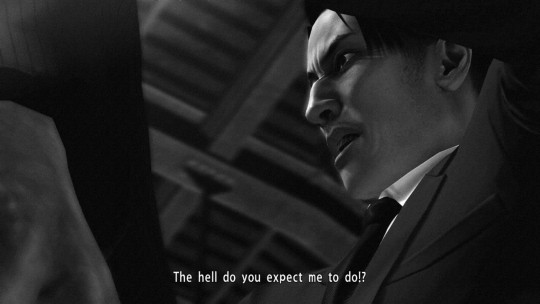
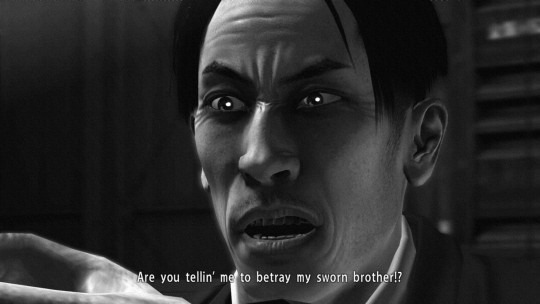
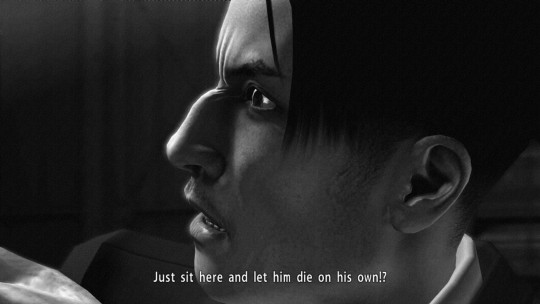
but it's not even about that. it's about dignity. majima tries to navigate the entirety of those situations, where he's robbed of freedom, where he's cornered, with dignity. because it's all he has. and when even that is stripped from him (the hole, y0), he seeks out the most dignified way to deal with losing your dignity -- willingly letting go of it (the lord of the night).
we see him put to impossible choices in other games (y5 comes to mind) and he handles that just fine without freaking out even when he's cornered. the difference is that in y5 he had a dignified way of resolving that situation. what actually makes him "freak out" and lose his cool is being robbed of a dignified solution. the dignity in following his principles, not betraying his values, is something he goes ballistic at the thought of losing.
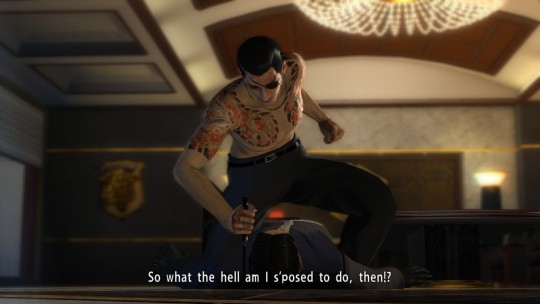
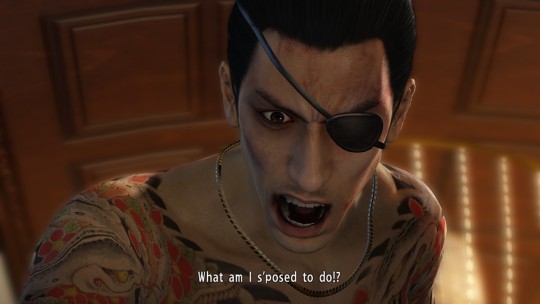
it's not just that he can't "risk" not being able to keep a cool head, or that he can't "stand" freaking out, its that he can't stand the humiliation of it. of not being perfectly composed and in control of himself all the time. he's too proud. and this is why mad dog is so therapeutic for him, because its a character who doesn't give a single fuck about how hes perceived, wielded by a guy who cares excessively about how hes perceived. he learns so much from mad dog over the course of the series, i genuinely think mad dog saved his life. because i was thinking about all of this going, my god. youre in the YAKUZA???? and youre living like THAT?? no fucking wonder he had to invent a persona to larp as just to not shoot himself.
but thinking more about it, it's like. of COURSE he is. of COURSE hes yakuza. because!! as a civilian, you're just slave to the same system everyone else is a slave to. you have to bow to it, and you don't even get a choice. so... what does he do. he makes his own choice. if hes going to be a slave in a system, it's going to be a system of his own choosing that he can respect, however flawed. yes, he's not "free" in the yakuza, and that is something he struggles with, but it's more about freedom of choice for him.
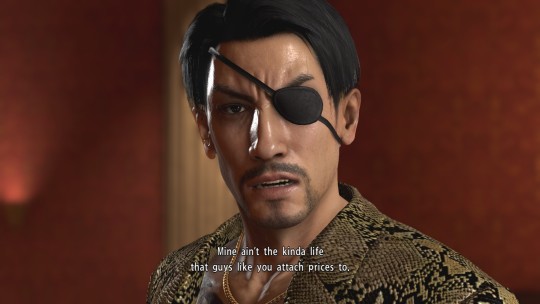
like. what a fucking thing to say. you cant attach a price to my life. you cant make USE of my life. you cannot USE my death as a TOOL to further your own ends. because that's what ibuchi is saying, that he'll kill majima and his death will start a war which he will benefit from. and he refuses to BE that for anyone.

...other than, of course, shimano and the men he respects, of which there are SO few in the tojo. (hello kiryu. hello saejima. this guy is in desperate need of people he respects and he will follow them around like a dog because he really wants to surrender power and "bow his head" because he's so exhausted from having to maintain it against himself and the world 24/7.)
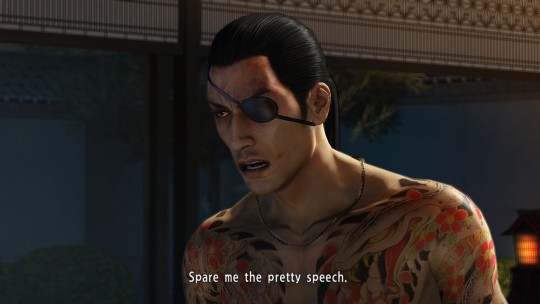
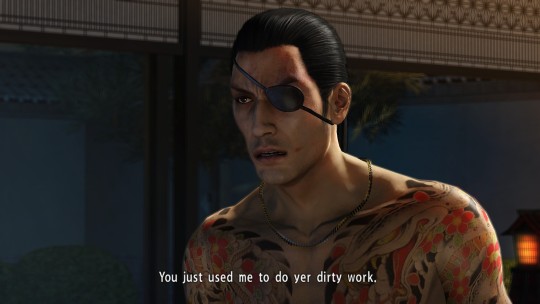
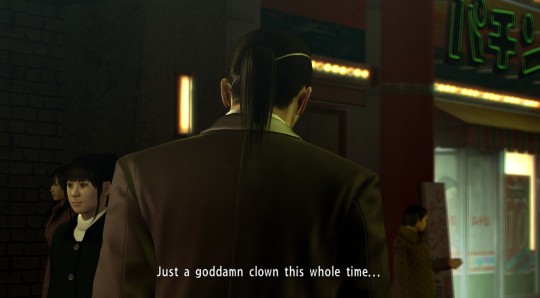
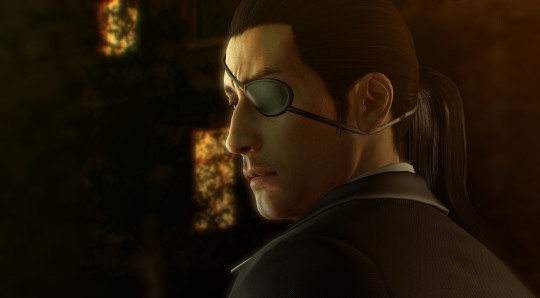
look at his face in this scene. he's completely distraught. over having been used in some scheme without his knowledge. robbed of his autonomy. i have never seen him look like this at any other point in the series.
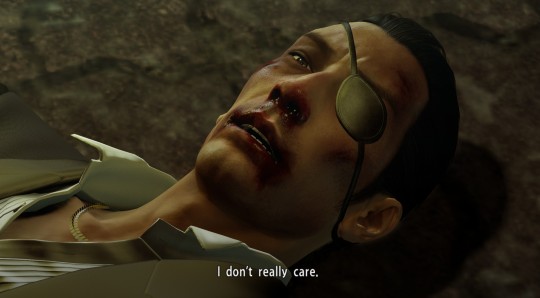
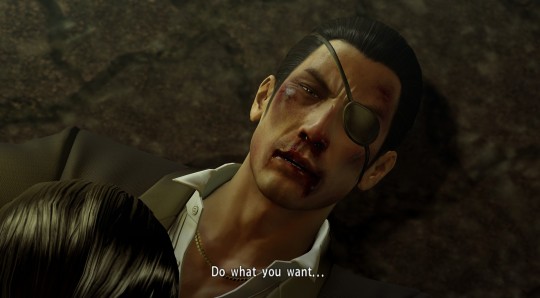
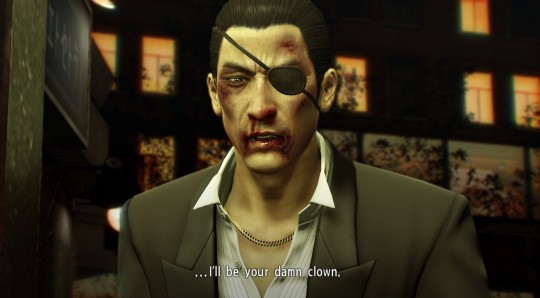
true resignation. utter defeat. this is partly what birthed mad dog, nihilism incarnate. sure, it takes being faced with the possibility that makoto will never wake up to finally "awaken" mad dog, but this is where majima is drawing his strength from -- this ability to tap into a state of complete indifference. this void. death.
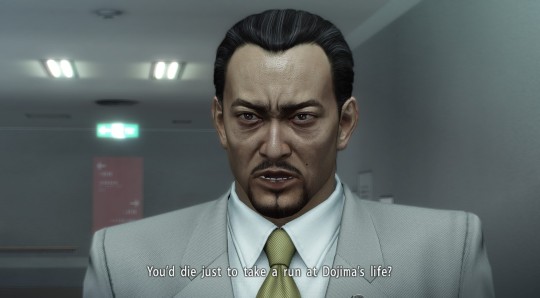
even sera is surprised. but this is the moment he understands exactly what kind of person majima is. because yes, of course he would. majima, and people like majima, will jump at any chance to make their deaths count, because they're constantly living with the guilt of all the terrible shit they've done up to that point. having the opportunity to die for a good cause, knowing it won't redeem them but get them at least a little closer to it, is a blessing. they don't have to think twice about it. this is the death drive he's tapping into.
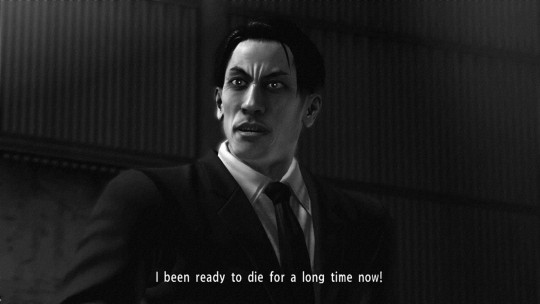
above all, majima wants to be useful. i think this need characterizes his relationship with kiryu, who is someone he respects. he's basically begging to let kiryu help him throughout y3. he agrees to go back to the clan because kiryu asks, twice. he's willing to die so haruka can live, because his death can accomplish something good. it's no choice at all.
but i'm far more interested in how this manifests in his relationship with shimano. this excerpt from an rggo story comes to mind.

i think shimano was, in a lot of ways, a tether for majima. the "leash" imagery is very accurate, but it suggests an entirely negative reading of their dynamic. the truth is majima likes being leashed. not only that, he needs it. he's just very discerning about who he will let leash him. he needs purpose in his life, needs to know hes useful, and for that he needs to devote himself to someone. and it needs to be a person, because he's too cynical to believe in a cause.
what that excerpt tells me is that he lost his respect for shimano. and when he died, majima became untethered. from the world. in the absence of saejima, or anyone else who could be that for him, he's adrift and aimless. lost.
it's not a coincidence he leaves the clan immediately after shimano dies. it's because of this, because of terada (he won't bow to someone he doesn't respect), and because he has, on some level, completed a large part of his duty to saejima by establishing his own family. he is without purpose. and i think it's maintaining this state of existence for years that turns him into the depressed, defeated man we see in y5.
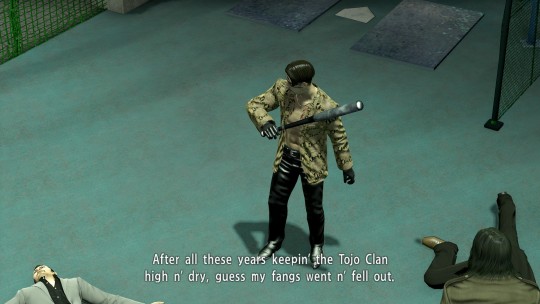
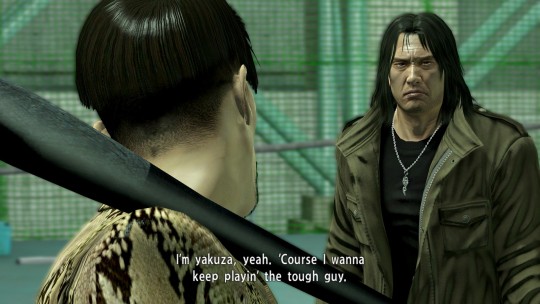
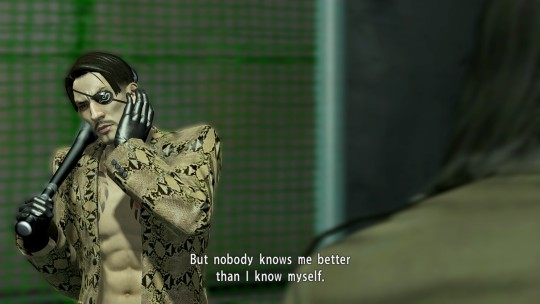
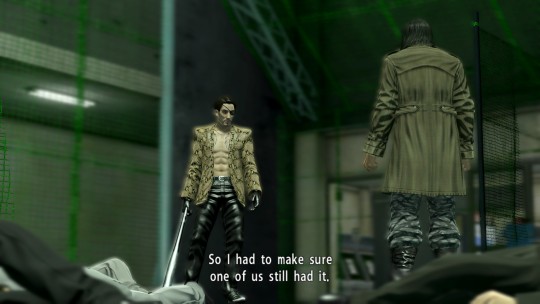
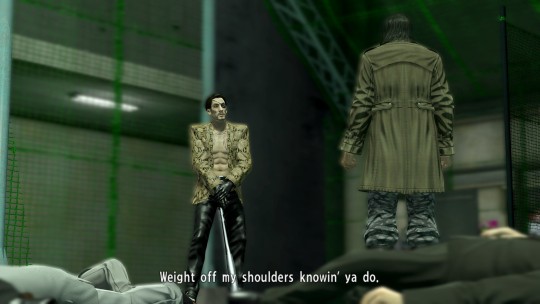
he got burnt out, because it's exhausting being in this kind of active conflict with yourself all the time in the name of maintaining a sense of personal power and agency. over even your own emotions. he's truly relentless. but sooner or later, it was going to catch up to him.
#hi. can you tell how much time i spend thinking about him#majima goro#yakuza#my analysis#yapping#majeem#long post#this will also get incorporated into the essay...
79 notes
·
View notes
Text
Why's Lu Guang's hair white?
It has occurred to me that a lot of people on the English side of the fandom aren't aware of the Lu Guang white hair theory.
It's a very popular theory/headcanon on the Chinese side (I'd say maybe 30% of people believe in it?) of the situation. I have no idea who in the English fandom have talked about it and who haven't, so I'll just provide what I know of it. Full disclaimer that I wasn't the first one to make this observation.

The theory is based on this scene right here, episode 12 of season 2. Here, Qiao Ling has a singular white hair after receiving Xixi’s powers (and seemingly activating them for the first time). This can be either interpreted as her spontaneously gaining a white hair, or as just an effect of the lighting.
Lu Guang has (presumably) received and activated Cheng Xiaoshi’s powers before.
Lu Guang’s hair is white.
Are you picking up what I’m putting down?
It doesn’t help that his eyebrows are a different colour. In pretty much every piece of official media, they’re a grey a bit lighter than his eyes. Except for in the phone ad for OPPO (I think that’s what that was…?) where his eyebrows are largely black, except for one shot where they’re their normal grey, so I’m fairly certain that’s just a mistake in animation. I could’ve sworn to God there was one piece of media where his eyebrows were white, but I can’t find said piece, so I guess that was a fever dream.
Quite a few people have wondered how a naturally white-haired person would have darker-coloured eyebrows. Based on that, the argument is that Lu Guang’s natural hair colour is darker, and his hair turned white later in life. Of course, from an artistic standpoint, this evidence is… hard to work with. Characters with a light hair colour paired with a light skin colour often are drawn with their eyelashes and eyebrows being a darker colour for the purpose of contrast. It’s not rare for a white-haired character with fair skin to end up with grey eyebrows, since it makes their eyebrows more easily visible while still looking lighter. The problem?

Ouyang Bubai (how does the English fandom refer to him…? Do I use pinyin for him? Jyutping? Cantonese Yale? Is his Chinese name written in simplified or traditional???) has almost the exact same hair colour as Lu Guang. His eyebrows are white.
Paint tool sai version 2 colour picker (and visual examination) tells me his eyebrows are a slightly different colour than his hair, being a bit warmer and a smidgeon darker, but the point stands. Compared to Lu Guang’s eyebrows, you can definitely tell they’re drawn differently.

Other light haired characters like the Li siblings receive the same treatment as Ouyang Bubai, having pink eyebrows. It’s just Lu Guang who has his situation.
And no, it’s not a matter of convenience. Link Click’s eyebrows are always drawn with black lineart and a solid fill, usually one matching the character’s hair colour. Lu Guang’s eyebrows match neither his eyes nor his hair, something that would theoretically make drawing him more inconvenient because now you’ve got one extra colour in the pallet.
But if the point was that Lu Guang’s hair isn’t supposed to be white, then why make his eyebrows so light? Because now, what is potentially foreshadowing looks like artistic liberty. Was it for the sake of visual cohesion? To throw theorists off? Is it something about the character design process and Inplick?
Anyway, a few possibilities emerging from this theory.
How many times has Lu Guang went back in time for Cheng Xiaoshi if all his hair is white? Or does the process speed up the more you use another person’s powers?
Does his hair turn white all at once whenever he goes back in time, or is it gradual? Like, was there ever an attempt where Cheng Xiaoshi went to bed, woke up, and went “woah Lu Guang that was one mean mental breakdown you had last night if you bleached half your hair”
Does using another person’s powers affect you negatively in other ways? Is that why Lu Guang has limited attempts – not because he’s running out of photos, but because he’s running out of time himself? And, my personal favourite:
The white hair isn’t because of power usage. It’s because of stress. Lu Guang is just a lot more stressed than Qiao Ling is.
107 notes
·
View notes